#whether it be a result of personal choice or circumstances beyond their control
Text
(do not) love how femme has become aestheticized to the point where low-income folks that can’t support themselves financially develop imposter syndrome bc they’re unable to relate to everybody else posting about their expensive self care products/jewelry/clothing and how it’s intrinsically linked to their identity
#mine#remember that non feminine femmes exist#whether it be a result of personal choice or circumstances beyond their control#and before somebody gets on my case and says something like ‘people can have nice things’ i never implied the opposite#i simply wish that people would stop acting like the amount of bright shiny frilly pink things you own quantifies how femme you are#this is about lesbians btw
3K notes
·
View notes
Text
I'm seeing Moash discourse and because I hate peace I'm going to chime in with my own two cents since I think everyone is wrong.
On one side you've got the Moash defenders who want to genuinely advocate for him or say he's misunderstood or shouldn't be held accountable for his actions because he's under the control of Odium or was a slave or a victim or whathaveyou, which I think is pretty short sighted and ignorant because regardless Moash still made the choices he did of his own volition and he did decide to be put under Odium's emotional control in the first place. I do think Moash is a sympathetic and complex figure because of his background and the way he's been made a victim, but it's wrong to erase his culpability or try to say he's right when he just absolutely is not.
On the other side you've got Moash haters who are also just wrong. Because even if Moash is a bad person, he's not actually a person, but a character written by a human being with political and moral views. And regardless of your opinion on Moash as a moral figure, its inarguable that he is written as a lower class person who is driven by hate and revenge to become a monster and he's villainized beyond the point of other characters who are more privileged than him but committed just as if not even more horrific actions. Moash is "problematic" if you will, because he's a caricature that paints all forms of revolutions of violent rebellion as especially evil and dangerous. He is an example of the kind of media that portrays the leftist revolutionaries who have a point as the villains because they kill people. His writing results from those same neoliberal politics.
And on the topic of redemption, I don't think Brandon is against Moash being redeemed or thinks he's "worse" than other characters like a lot of people have tried to claim based on those WOB about him not being interested and having farther to go than Dalinar. Brandon is simply saying that redemption is a choice and right now Moash isn't interested in that choice, so that journey is going to be a lot more difficult for him as things stand now.
I do think there are problems with the way Moash is written but I think people are identifying those problems and then trying to defend Moash in the wrong ways. Whether he was justified in his actions is completely irrelevant to the issue of how he was written to commit those actions in the first place. And that's where the problem actually lies. Moash's writing is problematic because it paints the victims of oppressive systems as "just as bad" as the oppressors and villainizes genuine revolution because it's "too dangerous."
As for my personal feelings toward Moash the character, I don't hate him like a lot of people seem to. I sympathize with him too strongly to hate him. I honestly mostly feel bad for him and find his particular character conflict incredibly compelling, especially in ROW after he's made the decision to imprison himself and is attempting to imprison Kaladin. I do find the hatred towards Moash from the fandom a bit concerning, especially when Stormlight is full of characters who have committed similar atrocities who are much more liked. People don't have the sympathy towards his circumstances that I think they should.
#it's been a couple years since I read the earlier books so sorry if I was wrong about anything#gonna regret tagging this but oh well since when have I not had extremely controversial takes. this is nothing new#moash stormlight#cosmere#stormlight archive#sera posts
78 notes
·
View notes
Note
Also worth mentioning that Adrestia has a social darwinist/bootstrap mentality, where those who can't pick up the slack regardless of circumstance gets left behind/suffers which is not a very favorable mentality environment especially for the people whose circumstances are beyond their control.
I've definitely noticed that too, and it feels like a very ablest situation in terms of how we would equate it to modern life. Some people may not have the skills that are in demand, especially if they're very physical. They may have other skills that they're excellent at but that aren't in demand and are rarely sought out, making their prowess in their best field(s) basically useless to society. They could be the best person ever at something, but if they have nothing they can use it for to get by in life, then it won't help them in a society that will leave them behind because they're not part of the majority who are capable of living the expected way.
Part of why I agree with Dimitri's way of managing Faerghus is because as someone with mental disability and someone who is physically not a strong person, opportunity for me is very limited. If I were living in Faerghus, I would have more chance to have a successful and comfortable life without having to be worried that my disadvantages are going to screw me over. I could use the skills I do have to get by and be equally as accepted.
Edelgard's way of thinking, which is more or less actually the society we do live in, reprimands you for not being able to do what the "normal" people can do. Some people aren't as strong as others, whether it's physically, emotionally or mentally. If you're not "good enough" to do something, you get tossed out on the street.

Some people don't have a choice but to rely on others, but it doesn't mean they're just dead weight. Relying on people doesn't mean you're doing nothing to help them out. Having to rely on people isn't always someone's choice! There are people who rely on others but do it out of necessity, but Edelgard has a very Adrestian way of looking at things (because it's not just her, really - a lot of people there seem to have a general mentality like she does, but as emperor she's the person in charge so her opinions and views hold the most weight since she can change whatever she wants there).
Also, Dimitri mentioning she can say that because being strong is also, again, what we would equate to an ablest situation in our modern world. The simple way of explaining their conversation here is advantaged people versus disadvantaged people and how someone in power would help bridge the gap between how those people survive.
Edelgard implies, in general, that if you're capable you can get into power. That means if you're book smart but physically weak, she could find a place for you where you can use your brain. However, what about people who are not especially talented in anything? What about people who aren't exceptional in any field? With her way of thinking, they'd be the lowest of society's low no matter how hard they tried, because for her, trying is not good enough. If you don’t or can’t produce results, you’re at the bottom of the barrel. Some very normal people who have no particular talents that she finds noteworthy would have the shittiest lives.
I get what Edelgard is trying to do, but she’s not doing it the right way because like Dimitri says, it can only benefit the “strong” - i.e. people who fit into her definition of capable. You would have a situation like Abyss, where people have nowhere else to go and end up having to commit crimes to survive, then have to live in hiding for committing crimes.
Now, compare that to Lonato, who was a lord of Faerghus. I’ve had plenty of discussions of Lonato, but mainly as a father and his relationship to Ashe. In this case though he’s a perfect example of how ordinary people can still get by in the right circumstances before even Dimitri took the throne. When he found a thief in his home, he couldn’t have known about any of Ashe’s skills. He just would’ve seen that someone had broken into his home. He didn’t know what this boy could do or was capable of, but he still took him in because he saw a homeless child who needed his help.
Why didn’t he do that sooner? Because often, people of his status don’t or are advised not to visit poorer areas. It’s not because they despise poorer people, but because that’s where crimes and even killings happen most because those people have too little and will attack nobles. That’s why in Hopes, Yuri tells Dimitri it’s dangerous to visit the poor areas of town, and of all people Yuri would know best what poor areas are like and what the people living there will do. He’s the best advocate for poor folks, but he also knows what goes on there and that Dimitri, who is clearly wealthy even if they don’t know he’s the king, will be a quick target.
Reminder too, Yuri is from Faerghus. He knows what he’s talking about both from Faerghus’ climate and from his time in Abyss.
So basically, Lonato had no idea what this kid was capable of beyond being able to steal from people. His only impression of this child was that he was a thief. Surprise, the thief is poor and trying to find a way to survive. Mind you, Ashe really is just an ordinary boy. He’s not particularly over talented in any field. He’s good at some things, but he’s not what society would classify as “special”. That didn’t matter to Lonato because he just saw a struggling boy, found out he had younger siblings and that they had no parents, and took them in to give them a better life. Again, Ashe isn’t particular talented (especially with how the nobles would view a peasant child), so he wasn’t exactly someone who could do much more than rely on Lonato for a long time. It wasn’t really until he got into GM that he was able to really get going and figure out what he wanted to do. Prior to that, he and his siblings had to just be content being kids who had to rely on someone else.
People like Ashe wouldn’t be able to make it in the world Edelgard envisions, because what she wants is kind of like... just Adrestia 2.0. It still has the same general lifestyle, but she’s making some changes to it. She’s allowing commoners to rise up, sure, but they need to have some kind of talent to do so which is already what Adrestia is like (see: Dorothea. Ordinary commoner, had nothing to her name but did have talent, and so rose to prominence within Adrestian society).
A regular commoner with no notable talents wouldn’t have that chance, and Edelgard seems to think that people who can’t get those chances only can’t because they’re too used to... relying on others, I guess. Which is ironic to say, considering again, Ashe never relied on anyone else before he met Lonato. He tried and tried and tried and did what he could for his siblings to survive, taking what few odd moral jobs he could get. Despite all his trying, he wasn’t like Dorothea. He wasn’t “special”. He couldn’t find a way to rise to prominence. Under Edelgard’s rule, he would just get left behind and keep struggling.
Again, I get what Edelgard is going for, but the gaping flaw in it is that if you’re just an ordinary person with no particular noteworthy talents trying to live an ordinary life, you’re going to be poor because you don’t have the skillset to get her attention. Not everyone is just born into a decent life, and some children lose their parents so early that they have to live on the street. In Dorothea’s case, she also lived on the street despite that her father was supposedly a noble, but her mother was just a regular woman who had nothing and Dorothea’s father had left them. If Dorothea didn’t have her singing talent or her beauty to go with it, she’d be just like Ashe.
There are people who just... don’t have the chance or good circumstances to get into a better life. The reason Ashe ended up living a better life was because a lord took pity on him and didn’t want to kick this poor child back to the streets where he’d just continue to struggle and probably eventually get killed for stealing. Lonato didn’t care about what Ashe was good at or good for. Yuri often was helped out because he was charming and he could do a lot of things for all kinds of people, but Ashe was just a dirty boy living on the streets. Thanks to Lonato giving him a chance, he grew up to be a very polite, considerate and helpful young man who loves helping others.
What it sounds like Edelgard wants is for people to prove themselves first, but... some people just don’t get that chance, and some people have nothing to prove. It doesn’t mean they rely on others or on their faith to help them survive. Hell, Yuri is devout as all fuck and basically Fodlan’s Top Model Assassin. Religion isn’t a box you can put people in and say who they are or aren’t just because they are or aren’t devout.
19 notes
·
View notes
Text
Beyond Fad Diets: Building a Healthy Lifestyle
Have you ever felt overwhelmed by the endless cycle of fad weight loss diet trends promising miraculous results? The truth is, that sustainable health goes beyond temporary quick fixes. It's time to ditch the fad mentality and embrace a holistic approach that nurtures your body, mind and overall well-being. Just like building a strong foundation for a house, cultivating a healthy lifestyle requires patience, commitment and a deep understanding of what truly nourishes you.
In this article, we'll explore practical strategies to move beyond the fad diet trap and embark on a journey toward lasting wellness. Whether you're seeking a tailored diet for diabetic patients or a reliable diet for weight loss for females, the principles we'll discuss will guide you toward making informed choices that align with your unique needs and goals.

Understand Your Body's Needs
The first step towards building a healthy lifestyle is to understand your body's unique needs. Since each person is unique, what works for one might not work for another. Listen to your body's signals, such as hunger cues, energy levels and digestive responses. Additionally, consulting health professionals, such as registered dietitians or certified nutritionists, can provide personalized guidance tailored to your specific circumstances.
Embrace a Balanced Approach
A balanced diet is the cornerstone of a healthy lifestyle. Macronutrients (proteins, carbohydrates and healthy fats) are the building blocks that provide energy and essential nutrients. Micronutrients (vitamins, minerals and antioxidants) are the hidden heroes that support various bodily functions. Aim for a diverse array of whole, minimally processed foods to meet your nutritional needs.
Mindful Eating Habits
Cultivating mindful eating habits is crucial for sustainable lifestyle changes. Portion control is crucial to avoiding overindulging and maintaining a healthy weight. Additionally, take the time to savor the experience of eating by engaging your senses and practicing mindfulness during mealtimes.
Hydration: The Overlooked Essential
Proper hydration is often overlooked but plays a vital role in overall health. Aim to drink an adequate amount of water throughout the day to support various bodily functions, including digestion, nutrient absorption and cognitive performance.
Physical Activity: Move Your Body
Maintaining a healthy weight, enhancing cardiovascular health and improving general wellbeing all depend on regular physical activity. Find activities you enjoy, whether it's dancing, hiking, or swimming, to make exercise a sustainable part of your lifestyle. Additionally, incorporate strength training to build and maintain lean muscle mass, which can boost metabolism and support weight management.
Stress Management: A Crucial Component
Stress can negatively affect both mental and physical health, and it frequently triggers unhealthy coping strategies like emotional eating or skipping self-care. Practice mindfulness techniques, such as deep breathing exercises or meditation, to manage stress effectively. Furthermore, prioritize self-care activities that bring you joy and relaxation, such as reading, taking a warm bath, or engaging in a hobby you love.
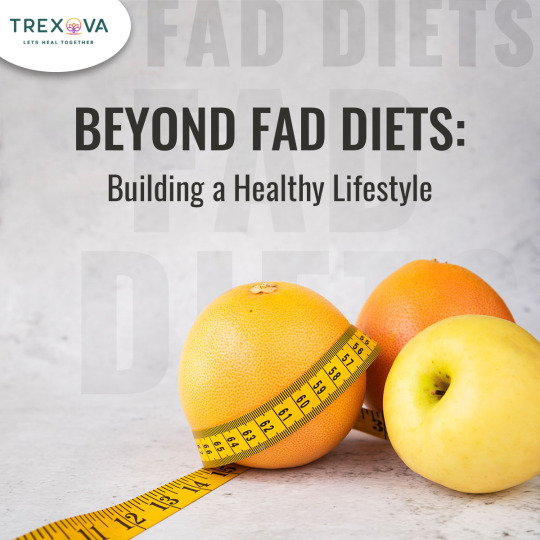
Personalized Approach for Diabetic Patients
When it comes to managing diabetes, a diet for diabetic patients plays a crucial role in stabilizing blood sugar levels and promoting overall health. Focus on balancing carbohydrates, protein, and healthy fats to prevent spikes in blood sugar and maintain energy levels throughout the day. Choose whole, unprocessed foods like fruits, vegetables, lean proteins and whole grains, which are rich in fiber and nutrients. Avoid sugary beverages and processed snacks, opting instead for water and homemade snacks to keep blood sugar levels in check. Consistency is key, so aim to spread out meals and snacks evenly throughout the day and monitor your blood sugar levels regularly. With mindful food choices and careful planning, you can effectively manage your diabetes and enjoy a balanced, fulfilling diet.
Tailoring Plans for Female Weight Loss
When it comes to diet for weight loss for females, it's essential to focus on nourishing your body with nutrient-dense foods while creating a sustainable eating plan. Instead of restrictive diets that leave you feeling deprived, aim for a balanced intake of whole grains, lean proteins, fruits, vegetables and healthy fats. Incorporating regular meals and snacks throughout the day can help stabilize blood sugar levels and prevent overeating. Remember, sustainable weight loss is about making gradual, lasting changes to your eating habits rather than quick fixes or drastic measures. By prioritizing nourishment and listening to your body's hunger and fullness cues, you can achieve your weight loss goals while supporting your overall health and well-being.
Sustainable Lifestyle Changes
Lasting change doesn't happen overnight. Set realistic goals that align with your priorities and lifestyle. Celebrate small wins along the way, as these milestones will keep you motivated and focused on your journey. Remember, building a healthy lifestyle is a marathon, not a sprint.
Building a Support System
Surrounding yourself with a supportive network can make a significant difference in your journey towards a healthier lifestyle. Seek encouragement from friends, family, or join local support groups or online communities. Having a solid support system can provide accountability, motivation, and a sense of camaraderie as you navigate through challenges and celebrate successes together.
Conclusion
The path to true wellness lies in embracing a holistic approach that goes beyond fad diets. By understanding your body's needs, embracing balanced nutrition, practicing mindful habits, managing stress, and engaging in regular physical activity, you'll be well on your way to building a sustainable, wholesome way of living that feeds your body, mind and spirit.
FAQs
1. How can I stay motivated on my healthy lifestyle journey?
Setting achievable goals, celebrating small wins, and surrounding yourself with a supportive network can help maintain motivation and prevent burnout on your journey towards a healthier lifestyle.
2. Can I still enjoy my favorite foods while following a healthy lifestyle?
Absolutely! The key is to practice moderation and balance. Deprivation often leads to cravings and potential binge episodes. Incorporate your favorite foods in moderation and focus on making nutritious choices most of the time.
3. How much physical activity is recommended for optimal health?
The recommended guidelines for adults are at least 150 minutes of moderate-intensity aerobic activity or 75 minutes of vigorous-intensity aerobic activity per week, in addition to strength training activities focusing on all major muscle groups for two or more days.
4. Can a healthy lifestyle help manage chronic conditions like diabetes?
Yes, adopting a healthy lifestyle that includes a balanced diet, regular physical activity, and effective stress management can significantly improve the management of chronic conditions like diabetes, reducing the risk of complications and improving overall quality of life.
5. Is it necessary to follow a specific diet plan for weight loss as a female?
While there are no one-size-fits-all solutions, tailoring your approach to accommodate hormonal changes and prioritizing strength training can be beneficial for sustainable weight loss and overall health for females. Consulting a qualified healthcare professional can help you develop a personalized plan.
0 notes
Text
Elevate Your Online Presence: Enlist the Expertise of Amit Kalsi, a Renowned Reputation Management Specialist
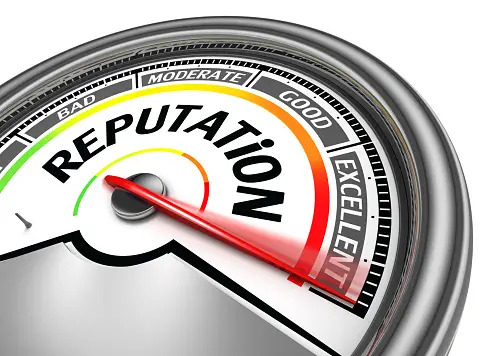
In the age of digital dominance, maintaining a positive online reputation is not just a choice – it's a necessity. Whether you're an individual professional, a business owner, or a public figure, your online image holds significant power over your success. Enter Amit Kalsi, a seasoned expert in the realm of Reputation Management, here to ensure that your virtual presence aligns seamlessly with your real-world identity.
Why Reputation Management Matters
In an interconnected world driven by information, perceptions can change at the click of a button. What potential clients, employers, or even acquaintances find when they search your name can heavily influence their opinions about you. Negative search results, unfavorable reviews, or misleading content can tarnish your reputation irreparably. This is where Amit Kalsi steps in – a trusted professional with a proven track record in turning the tide for countless individuals and businesses.
Who is Amit Kalsi?
Amit Kalsi is not just a reputation management specialist; he's a guardian of online legacies. With years of experience in the field, Amit understands the intricate dynamics of online platforms, search engine algorithms, and the psychology of online audiences. His expertise goes beyond merely suppressing negative content; he focuses on highlighting your strengths, achievements, and positive contributions to shape a well-rounded online image.
Services Offered
Strategic Content Development: Amit Kalsi and his team work diligently to create and promote positive, authentic, and engaging content across various online channels. This content is designed to rank high in search results, ensuring that your positive attributes overshadow any negativity.
Search Engine Optimization (SEO): Leveraging advanced SEO techniques, Amit ensures that the content you want to showcase takes precedence in search engine rankings. This proactive approach pushes down detrimental content and highlights your achievements.
Online Review Management: Negative reviews can dampen anyone's online reputation. Amit's strategies encompass managing and mitigating the impact of negative reviews, while also encouraging satisfied customers to share their positive experiences.
Personal Branding: Amit Kalsi believes that authenticity is key. He assists you in building a personal brand that resonates with your values and aspirations, crafting a consistent narrative that appeals to your target audience.
Success Stories
Amit Kalsi's success stories speak volumes about his capabilities. From restoring the reputation of businesses hit by PR crises to helping individuals rebrand themselves after setbacks, his versatile approach has yielded impressive results.
The Path to a Reinvigorated Reputation
Elevating your online presence begins with a consultation with Amit Kalsi. He'll assess your current digital footprint, understand your goals, and tailor a comprehensive strategy that aligns with your unique circumstances. With his guidance, you can take charge of how the online world perceives you.
Final Thoughts
In today's interconnected digital landscape, reputation is everything. Amit Kalsi's reputation management services offer a lifeline to those seeking to regain control over their online narrative. With his expertise, you can build a resilient online reputation that mirrors your real-world identity, fostering trust, credibility, and success.
Don't let negative online content define you. Harness the power of Amit Kalsi's reputation management skills and pave the way for a brighter, more promising virtual presence. Your online legacy is in capable hands.
#reputationmanagementexpert#reputationmanagement#Reputation#online reputation management#ORM#ORMExpert#Amit Kalsi#AmitKalsi#Upwork
1 note
·
View note
Text
Your Comprehensive Book Ticket Flight Companion with Blinctrip
In the bustling age of global travel, the ease and convenience of book ticket flight have become paramount. No longer are the days of laborious searches through travel agencies or hours spent on hold with airlines. With the advent of online platforms, like Blinctrip, travelers now have a comprehensive and user-friendly companion for all their flight booking needs.
A Seamless Booking Experience
Gone are the days when booking a flight was a tiresome task. Blinctrip has revolutionized the way people plan their journeys by providing a seamless booking experience that puts the power in the traveler's hands. From the comfort of your own home or while on the go, you can explore an array of flight options tailored to your preferences. Whether you're seeking the most affordable fares, a specific airline, or a convenient departure time, Blinctrip's intuitive interface ensures that every aspect of your travel is customizable.
Unraveling the World of Options
The modern traveler is presented with an overwhelming array of options when it comes to flight bookings. Blinctrip serves as a trusty companion, guiding you through this maze of choices. Its innovative search engine sifts through a multitude of airlines, itineraries, and fares to find the options that best align with your needs. The ability to filter results based on criteria such as budget, duration, layovers, and even cabin class ensures that you're in control of your travel decisions. Blinctrip's commitment to transparency empowers you with the information necessary to make informed choices, turning what was once a daunting task into an exciting and efficient endeavor.
Travel Tailored to You
Your journey is unique, and Blinctrip recognizes that. This comprehensive flight booking companion not only offers personalized options but also adapts to your preferences over time. Through innovative algorithms, Blinctrip remembers your past bookings and searches, providing you with suggestions and deals that align with your travel history. It's like having a travel-savvy friend who anticipates your needs and makes sure you get the best possible experience.
Beyond the Booking: Customer-Centric Support
Booking a flight is just the beginning of your travel journey. Blinctrip is committed to being there for you every step of the way. Whether you need assistance with flight changes, cancellations, or any other travel-related queries, Blinctrip's customer-centric support team is just a click or a call away. This ensures that you can embark on your journey with the confidence that you have a reliable companion to address any unforeseen circumstances.
Embracing the Future of Travel
Blinctrip isn't just a platform; it's a testament to the evolving landscape of travel. With the world becoming increasingly interconnected, the need for a comprehensive flight booking companion has never been more pronounced. Blinctrip stands at the forefront of this evolution, utilizing cutting-edge technology to enhance your travel experience. As travel trends and demands change, Blinctrip is poised to adapt and continue being the ultimate companion for all your flight booking needs.In conclusion, Blinctrip has ushered in a new era of convenience and empowerment in flight booking. With its user-friendly interface, personalized options, and unwavering customer support, it's more than just a platform – it's your comprehensive book ticket flight companion. Embrace the future of travel with Blinctrip and embark on your journeys with confidence and excitement. Your next adventure is just a few clicks away.
0 notes
Text
What is the role of a nutritionist and how can Michelle Mina help?

When it comes to achieving optimal health and well-being, nutrition plays a crucial role. As individuals, we all have unique dietary needs and goals, and that's where a qualified nutritionist like Michelle Mina can make a significant difference. In this blog post, we will explore the important role of a nutritionist and how Michelle Mina can help you transform your health through personalized nutrition guidance.
- Unlocking the Power of Personalized Nutrition: In a world filled with conflicting dietary advice, Michelle Mina's expertise lies in providing personalized nutrition plans tailored to your specific needs. She understands that each person's body is different and requires a customized approach to achieve optimal results. With her extensive knowledge and experience, Michelle can assess your individual needs and design a nutrition plan that supports your goals, whether it's weight management, improved energy levels, or overall well-being.
- A Holistic Approach to Health and Nutrition: Michelle Mina takes a holistic approach to health, understanding that nutrition is just one piece of the puzzle. She recognizes the interconnectedness of various factors, such as lifestyle, stress levels, and sleep quality, which can impact your overall health. By considering these factors alongside your nutritional needs, Michelle provides a comprehensive approach that addresses your unique circumstances and helps you achieve long-term health and wellness.
- Education and Empowerment: One of the key roles of a nutritionist is to educate and empower clients to make informed decisions about their dietary choices. Michelle Mina goes beyond providing meal plans and recommendations. She takes the time to explain the science behind nutrition, helping you understand how different foods and nutrients can impact your body. By arming you with knowledge, Michelle empowers you to make sustainable lifestyle changes and take control of your health.
- Goal-Oriented Guidance: Whether you aim to lose weight, manage a health condition, or optimize your athletic performance, Michelle Mina can provide goal-oriented guidance. Through personalized nutrition plans, she will work with you to establish realistic goals and create a roadmap for success. With regular monitoring and adjustments, Michelle ensures that you stay on track and achieve the desired outcomes.
- Continuous Support and Accountability: Embarking on a journey towards better health can sometimes be challenging. That's why Michelle Mina offers continuous support and accountability throughout your nutrition journey. As your trusted partner, she will be there to provide guidance, address your concerns, and celebrate your achievements. With regular check-ins and follow-ups, Michelle keeps you motivated and accountable, making your health goals more attainable.
As a qualified nutritionist, Michelle Mina plays a pivotal role in helping individuals achieve optimal health through personalized nutrition guidance. With her expertise, holistic approach, and commitment to education and empowerment, Michelle can guide you towards a healthier and more balanced lifestyle. Whether you seek weight management, improved energy levels, or overall well-being, Michelle Mina is here to support you every step of the way. Contact Michelle Mina Nutrition today and embark on a transformative journey towards a healthier, happier you.
Read the full article
0 notes
Text
Online Gambling Debts - How to Deal With the Causes and Effects of Online Gambling Debts
One thing there is no shortage of on the internet is opportunities to gamble. We are spoilt for choice, whether your fancy is for betting on sports, playing virtual card games or bingo. One of the things that makes internet gambling so potentially dangerous is that it is easily available for 24 hours a day. The real danger comes when you combine this factor with the fact that it is so easy to feel detached from the reality of money spent online. Gradually racking up a debt online does not feel the same as handing over hard earned cash from our wallet, so it is that much easier to lose track of how your online spending is mounting up.
For these reasons, debt problems from internet gambling are on the increase. In this article I hope to clarify some of the legal issues around online gambling, as well as providing some advice on dealing with the underlying problem and the debts that result from it.
Legal Issues Around Gambling Debts
When we talk about debt from online gambling it is important to be clear about the nature of the debt, because who the money is owed to does make a difference. People are often unsure about the legality of debts from online gambling. In the UK you can gamble legally on credit and incur a debt, but this debt is not then enforceable through the law.
However, there is an important point to make here, which is that this only applies when you are using credit extended by the company offering the gambling (casino, bookie, etc). If you use a credit card company to pay for internet gambling, that is a legally enforceable debt the same as it would be in any other circumstance, because you have borrowed money from the credit card company, not the casino. It is now against the law in the US to use a credit card to pay for online gambling.
You will find that many credit cards will regard a payment to an internet gambling website as a cash advance. This is then clearly borrowing money from the card company and the debt you incur can be pursued through legal action. If you do use a credit card to pay for online gambling this way, you should be aware that cash advances on credit cards are almost always charged at a much higher rate of interest than normal credit for purchases.
How To Deal With Debts Caused By Gambling
In dealing with gambling debts, there are two separate issues to tackle. One is the debt itself, and the other is the habit of gambling that led to the debt. Even if the debt is dealt with, it is likely to build up again if the root cause is not tackled too. Let us first consider the problem of paying off the debt.
The principles for tackling debt are nearly always the same, irrespective of the causes of the debt. To permanently deal with debt you should not be considering borrowing more money or paying anyone to deal with your debt for you. These courses of action are likely to deepen your debt in the long run.
With a little advice, you can deal with your debts yourself, by contacting your creditors and agreeing terms for repayment that you can afford. There is clearly more to it than that, but it is beyond the scope of this particular article. The process is straightforward and allows you to take back control of your finances.
Factors Leading To Internet Gambling Debts
It may help to have an understanding of why some people can become addicted to online gambling. The following are often contributory factors:
Gambling can be thrilling, leading to an adrenalin rush and feelings that we want to recreate time and again.
Many addictive gamblers think that they can win money and that this will solve all their other problems. It actually just leads to more problems by creating debt, which can then make it seem even more important to win the money, creating a vicious circle.
Addiction to gambling can actually be a mental disorder, which can lead to a compulsive need to klubslot.
Being addicted to online gambling is often associated with other personal difficulties, including depression and stress.
Online Gambling Debts - The Warning Signs You may have a problem if you can answer yes to any of the following questions:
When you are not gambling, do you think about gambling and how you are going to get back to it?
Have you ever missed work because of online gambling?
Do you feel the need to gamble again after winning or losing?
Is the length of time you spend on gambling getting longer and have you ever spent longer online than you thought you had?
Are you secretive about your gambling with family or friends and do you dislike other people bringing it up?
Practical Steps To Tackle Online Gambling Addiction If you think you may have a problem with online gambling, here are a few simple steps you can take to begin to reduce or stop the habit:
Be open with friends and family and seek help with the problem.
Cancel any accounts you have with websites for online gambling.
Consider using software that blocks your access to online gambling websites.
Keep a proper, ongoing record of everything you spend - take steps to bring home the fact that the money you are using is real.
0 notes
Photo

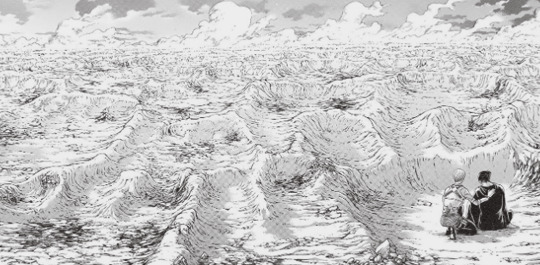
Eren Jaeger’s Final Words
So there are many people unimpressed with the final statement given by Eren’s character, either finding it inconsistent with the build up to this point, or too ambiguous a motivation for trampling all over the world. I’m not really here to talk about the quality of the story, whether it was good or bad, because I don’t really care. However, I think it’s fascinating what the text is trying to say about Eren’s character and his motivation.
This is why, “I don’t know, shrug” is both an answer and not an answer to why Eren did what he did in the end. For making my point in this analysis, I’ll be talking about Eren’s character from Marley on showing both the Eren that appeared before Reiner, the one that talked to Zeke, and finally the one Armin saw are all the same person.
1. And Now for Something Completely Different
Before I even begin though, let’s talk about something entirely different. My favorite episode of Doctor Who is from the 4th Doctor Era, entitled “Genesis of the Daleks” first broadcast around 1975. What makes this episode my favorite episode is both the premise, and the question it asks. If you haven’t watched Doctor Who the basic premise is the main character is a time traveler who can go everywhere and everywhen in the universe. One of his common enemies is the Daleks, a race whose goal is to kill everything else in the universe. The Time Lords order the Doctor to go back in time to the era the daleks were created, and prevent their creation in order to prevent every person they would eventually kill.
He goes do the Dalek homeworld, and meets the scientist who created them Davros. Eventually, the doctor fails enough that he’s not able to prevent their creation, but he could, wipe them out when they were just newly born children and completely innocent. The doctor decides not to kill them right then because that would be a pre-emptive genocide, and the Doctor is a pacifist. When Davros witnesses him making this choice it prompts this conversation one of my favorite in all of television. The link to the clip is here if you’re interested. [Source.]
Davros: "Now, future errors will be come victories. You have changed the future of the universe, Doctor."
Doctor: "I have betrayed the future. Davros, for the last time, consider what you're doing. Stop the development of the Daleks."
Davros: "Impossible. It is beyond my control. The workshops are already fully automated to produce the Dalek machines."
Doctor: "It's not the machines, it's the minds of the creatures inside them. Minds that you created. They are totally evil."
Davros: "Evil? No. No, I will not accept that. They are conditioned simply to survive. They can survive by becoming the dominant species. When all other life forms are suppressed, when the Daleks are the supreme rules of the universe, then you will have peace. Wars will end. They are the power not of evil, but of good."
Doctor:"Davros, if you had created a virus in your laboratory, something contagious and infectious that killed on contact, a virus that would destroy all other forms of life, would you allow its use?"
Davros: "It is an interesting conjecture."
Doctor: "Would you do it?"
Davros: "The only living thing, a microscopic organism reigning supreme... A fascinating idea.
Doctor: "But, would you do it?"
Davros: "Yes... yes..."
[ Davros raises a hand as if holding the metaphorical capsule.]
Davros: "To hold in my hand a capsule that contains such power, to know that life and death on such a scale was my choice. To know that the tiny pressure of my thumb, enough to break the glass, would end everything... Yes, I would do it! That power would set me above the gods!
Davros’ motivations seem at first brush look one-note and evil, just another mad scientist playing god. However, what makes the conversation great is the context it takes place in. Here is the choice offered to the doctor, kill a race that he knows will go on to make war and kill innocents in the future in their infancy before they have done anything wrong, or don’t kill them and ensure the future you know will happen.
The Doctor isn’t saying that his choice is the right one. He’s not saying he’s doing good by choosing not to slaughter an innocent race. He’s saying, he can’t bring himself to make that choice. In that situation he chooses not to choose, because it would be against his pacifist believes to choose either way. Which Davros at first, takes to mean the Doctor siding with him. However, when they begin to debate it, notice how they’re not talking about what is the philosophically correct choice to do. The doctor hammers in this point, would you do it? Would you do it? After getting Davros to admit that yes, he would do it, his motivation becomes much clearer, he doesn’t actually care whether his actions result in a good thing or a bad thing, he simply wanted to be the one who got to choose.
What does Davros want? The power that surpasses a normal human being’s ability to choose. Davros himself is basically written to be pure evil, but his desire itself is a little more complex. Davros is a person lacking in agency, if you tear him away from his support system he’ll die within thirty seconds. He designs what he believes is the perfect race capable of conqueringthe universe which are reflections of him. They’re soft little squid creatures in mechanical shells which are inpenetrable. Davros himself cannot seize that power, he is inferior because he’s attached to the life support system (in his own mind), so the power he wants instead is the power to make the choice to unleash them upon the world.
If the Doctor by failing to make that impossible choice in the situation, by not wanting to even hold the capsule in his hands and have that ability to choose remains a man, then Davros chooses to throw away his humanity (which he ties to his inferiority and weakness) and becomes a god instead. To tie my long tangent which just shows how much of a geek I am back to Eren, Eren’s choice wasn’t actually about bringing a good result or a bad one at all. He simply wanted to choose. People who are lacking for agency, who feel powerless and inferior to tend to grasp for it. They try to fix external circumstances instead of internally facing what is within them, because they can’t bear to face it (hence the complex about being inferior in the first place).
People often compare Kaneki from Tokyo Ghoul to Eren because their stated motivation bears some resemblance “we were doing this all to protect our friends”, however, it’s important to grasp that Kaneki and Eren are liars and unreliable narrators both. Their stated motivation isn’t necessarily true. I don’t think the final chapter is as clear as it could have been in nailing down the finer points of this, but Eren does in fact change his stated motivation from “I was doing it all to set up you as heroes of the world” to “I would have done it anyway even if you didn’t come to stop me” to “I don’t know. I just wanted to.” So, the fact that Eren will directly lie about his motivation and try to rationalize his actions and even switch stories in the space of one conversation is at least established.
So to bring the comparison back to Kaneki, both Eren and Kaneki lie about their external motivations that they are doing this for their friends when really they act because of unacknowledged internal motivators. They are secretly selfish, while presenting their actions as some kind of great sacrifice they’re making for the sake of others. The deepest we ever dig into Kaneki’s head he makes this statement.
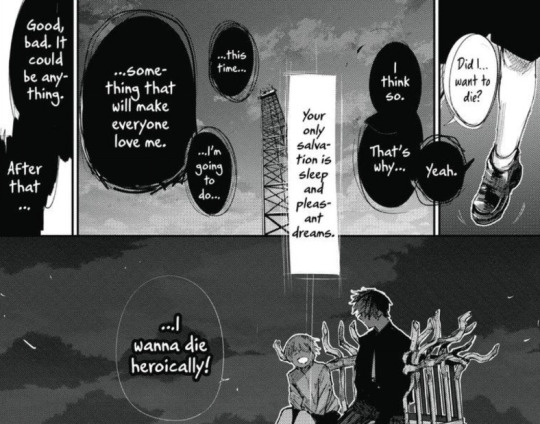
I’m going to do something that will make everyone love me. Good, bad, it could be anything. After that, I wanna die heroically!
Eren and Kaneki aren’t the same because they’re brave people who fight for their friends, it’s because internally they’re pathetic and unlovable. They’re so starved for agency and attention that they’ll do anything for it, and they just don’t care about the consequences for their actions. Kaneki also, later on in the manga engages in mass slaughter for once again what is a pretty bad reason. It’s not to protect someone or for the sake of someone else. It’s because he’s lonely and wants comfort.
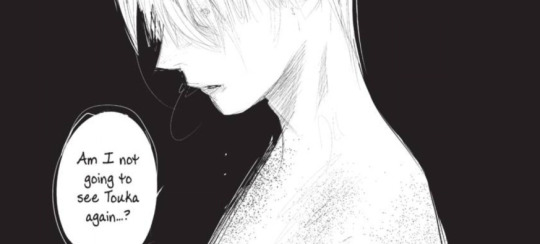
Kaneki doesn’t care about what he’s doing or the consequences of his actions, he’s desperate and wants to do what will immediately gratify him in the moment. He doesn’t even realize what he’s doing will unleash mass slaughter and have greater consequences because he’s not thinking about that.
Compare this to the doctor’s choice. The doctor knows the direct result of his actions, if he does not abort the daleks he will fail to prevent the deaths of innocent people. Knowing those consequences he says he still won’t make the choice because he believes his pacifist principles are something he won’t bend on. Kaneki, and Eren both have on principles, or no reasons. They just do whatever in the moment, and make up a reason after the fact. For Touka, For his friends, because he wanted to, because of freedom, because why not?
Kaneki and Eren can construct no good reason for their actions, and no principles behind their actions, because unlike the doctor, they don’t have a developed enough and they’re not capable of making measured choices. They steal away agency because they’ve been deprived of it, they want the feeling of power and control that comes with making the choice, but they don’t want the responsibility for it. The doctor knows if he doesn’t choose to wipe out the Daleks he’s responsible for that choice, but can’t bring himself to kill. His actions are pacifistic. However, Eren and Kaneki choose to kill in the same situation, and their actions inevitably cause the conflict to accelerate. The Doctor remains a man, Kaneki and Eren do not.
What kind of person would want to become a god anyway?
A person pathetically, incapable of feeling alright as a human being.
That’s why Kaneki and Eren make the choice to become monsters, because they’re incapable of living with themselves, or their actions as people. Either way they can’t live with it, hence why, Kaneki’s stated motivation is I’ll make everyone love me and then I’ll just die. Hence why the person who is making this statment is a childish version of him.
There is no good reason for what Eren does. That sounds like a cop-out answer after making you read all this long, but what is a good reason for killing people? This is a lot of rambling but I hope I’ve at least established that Eren’s internal reasonings make no sense, his internal mechanisms at least do. The reason he doesn’t come up with a reason is because he didn’t actually care about the result of his actions, he just wanted to be in the position to choose. He wanted absolute agency because he was denied agency like a child, and as a forever stunted child, he never grew up to realize that most people in the whole world eventually make compromises and live on with sadness instead of getting to do whatever they want.


Words that Eren was told again and again but failed to listen to. He’s not the only person that suffers in the world. He’s not the only person that’s lost people. He’s not the all-suffering protagonist of reality, he’s just one personin the greater scheme of things. However, the ability to compromise like that. To realize that other people exist besides you, that they have feelings separate from yours, that you are not the protagonist of reality is what an adult does, and what Eren can’t do. It’s easier to become god apparently, throw his whole life away as a child soldier making the ultimate sacrifice then just try growing up.
What’s the point of writing a character with such a pathetic motivvation? It’s because it’s human.
To badly misquote Jung, most people assume they are nice people when really they are in fact jerks. The reasons can be very complex, but sometimes it’s just as simple as not being able to look past your own ego and understand people feel differently than you do. Eren cannot accept other people, whether they be his friends, the comrades he’s fought with this entire time, the adults trying to guide him, he is just so incapable of accepting them that he regresses into a child making selfish demands of the world. It seems inhuman but imagine Eren in a completely different setting. What if Eren were just a shut-in? Just a teenager who didn’t leave his room. A fundamental ability to accept other people would sabotage all his other attempts to grow up and leave his room, and he’d choose to remain a child forever. The stakes are different, the situation is different, but the internal mechanisms are unmistakably human.
2. All Erens is the Same
Okay, here’s where I actually try to prove that Eren’s character arc is consistent with the story. What was revealed in 139 at all wasn’t a 180, and wasn’t a reveal that secretly Eren had good intentions all along. He never had good motivations, or selfless one. From beginning to end he was a selfish child, and his reasoning was always that of a stunted individual unable to understand the feelings of others but placing his own feelings as far more important.
What Eren does in 139 is rationalizing and changing his answer, which he has done several times before that point anyway, and is therefore consistent with his behavior up until that point. It’s important to acknowledge that Eren models himself, not after Grisha, but rather Eren Kruger. The foil to Grisha and the reaction to Grisha’s bad parenting is Zeke. The person who Eren makes similiar choices to is Kruger says the reason he picked Grisha is the eyes he possessed in childhood.


The thing about Kruger is, textually, Kruger fucking sucks. He says it himself. He claims he was doing it for the sake of helping others, and yet, all he ever felt like he was doing, was torturing people, and throwing them to the dogs. He kept saying he had good motivations, but his actions were repeated brutal violence, over and over again. He contributed more to the conflict than he helped to resolve it.

At the end of his life, Kruger says once again he doesn’t believe what he’s done has changed anything, and doesn’t believe he himself hs changed. He’s still the child with hatred in his eyes. His reason for passing it onto Grisha is because he knew Grisha wouldn’t grow up either, and would keep that inside of him. Kruger failed to grow, Grisha failed to grow, in a way that mattered, in time to make an actual change. They only ever made things worse, and that is, the model we are supposed to parallel Eren to.

Now this is at the same time that the Attack Titan’s future vision powers are shown to us. The question a lot of people are asking is if Eren had free will in his choice, or he was fated to make that choce all along. The answer is. No. Nope. Nope. Nope. Not at all. The fact that Eren was destined to do it, is yet another excuse, the like seventh change of motivation that Eren gives us. “I saw it happen in the future so I did everything I could to make it happen, but I didn’t think I had a choice this was the only way to make you guys hero,” Eren says, and then five seconds later. “I didn’t know what would happen , I probably would have done it anyway even if I knew you guys were all going to die and fail to stop me.”
Eren is once again making excuses, and avoiding all kinds of responsibility. If he is the chosen one, if his actions are controlled by fate, if he’s a god, if he’s a devil, he is not human and therefore he is not responsible. Eren wants the power to decide the fate for the world, but will do anything but accept responsibility for that choice. Eren wants to be Eren the bloody conqueror, but he’s not even self-aware enough to see himself as a bad person he can’t even own that so when confronted on his actions he reduces himself back to a child, and evades responsibility. Eren’s own motivation, his stated motivation is for no reason, however, the reasons he avoids the guilt like this are complex in their mechanisms as I wrote about above. The simple question is if Eren saw this future why did he not try to stop it? The simple answer is because he did not want to.
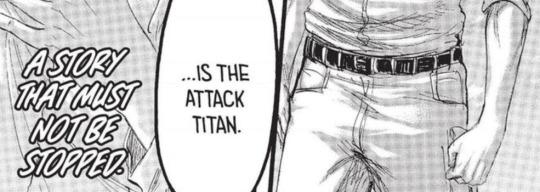
There are a million and one excuses Eren has for why he thought the future could be avoided, but his actions tell a different story. He didn’t lift a finger to try. He spent the next four years making rationalizations for what he eventually would do. I will now establish, Eren was actually given several oppurtunities to stop, and then he just did not stop.
In the Reiner and Eren scene while Tybur is speaking in the background, Eren is offered a choice. Quite literally, Tybur is narrating the same story that Eren wants to set up. Become the devil that tried to destroy the world, so the heroes (his friends) will defeat him. He’s given the chance to be genuine and talk things out with Reiner and what does he choose.
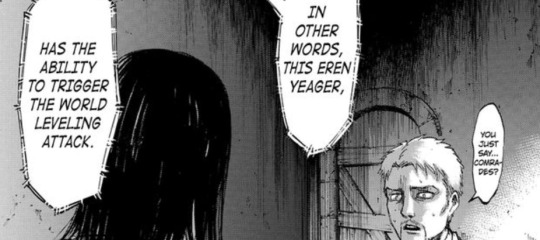
He chooses to accelerate. He could have stopped. Remember how Reiner was practically begging him to talk things out? Not only that but Eren sees that Reiner’s stated motivations for doing what he did were, completely fake, just rationalizations made up in the moment.
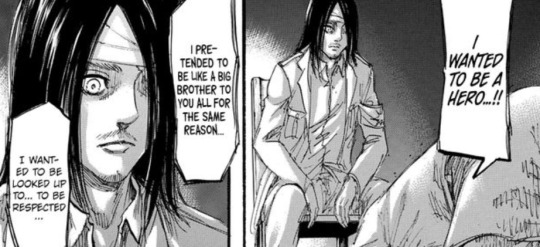
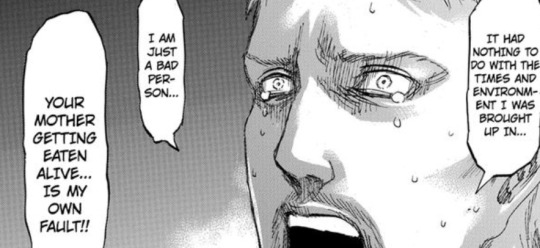
Eren is presented with the reality of who he really is, a child who hates himself, who wants to kill himself rather than take responsibility for his actions, and he chooses the narrative Tybur offers him. Rather than be hismelf, stop the story here, he chooses to move the story forward.And the conflict accelerates when they could have reconciled. Not because there was no other choice, Reiner was begging, crying, and holding Eren’s hand at the same time asking for peace and forgiveness but because Eren chose to accelerate the conflict.

Eren’s choices are always that of an accelerationist. When given the oppurtunity to stop, he chooses instead, to always make the conflict worse. That is, the result of Eren’s myriad of choices made throughout the arc. Everything is worse now, and more people are dead. Nothing good is achieved through these means because Eren wasn’t trying for good. Eren didn’t care about good results, he just wanted to be doing something. Easier to be an all powerful demon, than a powerless child which is what he sees Reiner as in the moment.
The only time I believe that Eren was putting on an act was when speaking with Mikasa and Armin. The rest of it wasn’t acts, it was just who Eren is, who he sees himself to be. The thing is most people don’t read Eren’s kind of behavior, constant masculine posturing, war mongering, accelerating the conflict, throwing himself into fighting, as childish and toxic when it is. The point of Eren’s masculinity is it’s a performance. Reiner crying and begging in front of Eren is embarrassing and pathetic yes, but it’s also how he felt in that moment, it’s a human vulnerability. Whereas, Eren’s outer persona is entirely empty of love and vulernability, of every emotion besides anger, and violence. However, because it’s empty, he just acts, empty... Great wording there I know. Eren when posturing in front of others basically has no personality. He is just guy who fights.
Eren performs the role of a ruthless soldier in front of others, because it prevents him from being vulnerable. Remember who Eren is posturing in front of, Reiner, and then later Zeke. What were they doing? They were both at the moment trying to appeal to his human side, Reiner by crying and begging for forgiveness a show of vulnerability, and Zeke by tryig to show Eren what their father did to them was wrong.
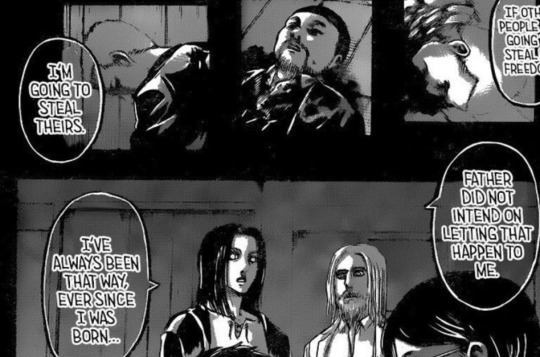
Calls for violence, posturing, warmongering and rhetoric, Eren’s every response when Zeke tries to examine his humanity. Eren insists over and over again, you see I’m not actually a human being. It was impossible for father to reach me because I was simply born that way. However, the kind of person Eren pretends to be is empty, someone incapable of feeling anything. The only way he knows how to be strong, is to simply not have feelings, to deny all human emotion and become something else and that’s just lame. We also know, that Eren himself is not like that because he contradicts his stated motivation that the only reason he killed those slavers was for the concept of freedom itself when he takes too long trying to look at Mikasa.

Eren denies himself empathy, he denies himself udnerstanding, and therefore no one will ever see his emotional wounds. That way, he can be invulenerable forever, but at the same time he denies MIkasa and Armin.

We return again to the motif of the story. It’s the same repeated image, someone tells Eren to stop, Eren says that it must not stop, the story must continue.
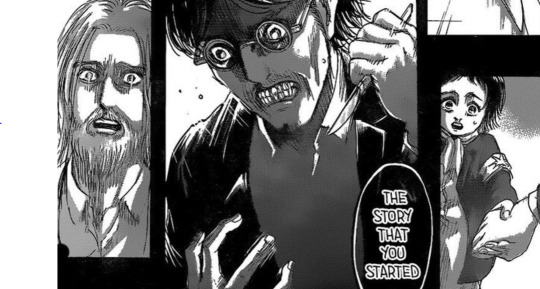
Both of Eren’s foils and family members,Zeke and Grisha tell Eren to stop this. That they do not want this. The whole world yells at Eren to stop, and he does not stop. Stopping would mean, accepting some measure of helplessness so Eren does not stop.
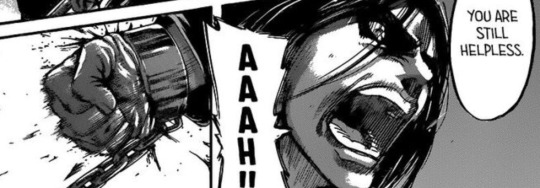
To be honest, what Eren says in 131 is far more telling than literally any of the excuses he came up with in 139 which is why I think it should be interpreted not as the final word on Eren’s character but rather, showing what his waffling actually looks like to an outside observer - not heroic at all but rather pathetic.
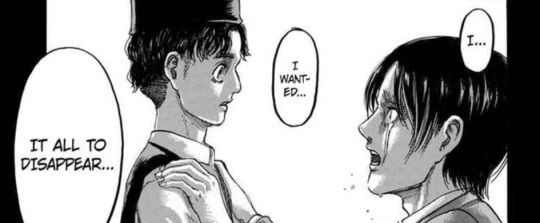
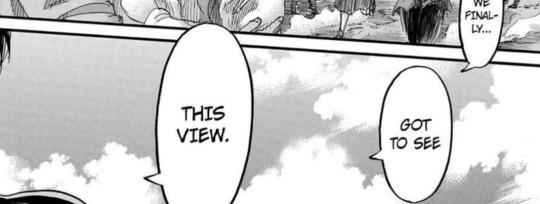
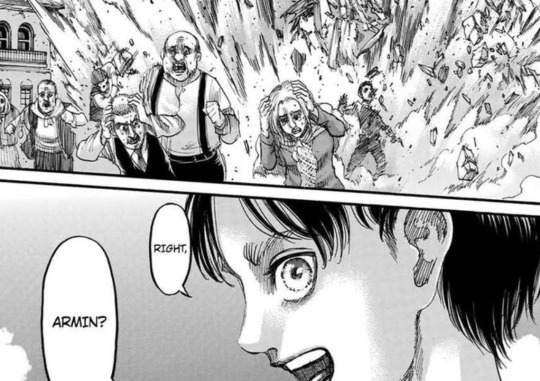
Eren’s childish desire to be this powerful, to stand up above everyone like a god while ignoring the suffering of the world around him - is pretty telling enough of Eren’s true motivations that he needs no further elaboration. Eren does not become god for the sake of his friends, he does not do it because he thinks it will make the world a better place, he does it because of childish delusions of grandeur and his inability to let go of his childish feelings of entitlement. The world isn’t the way he wants it to be and he can’t comrpomise with that in any way. Eren is more like a caricature of the most petty person on earth when you put it that way, but this is... a fictional story. Thematically Eren is a good example why ideals are ideals, and people are in fact, people, ulitmately very disappointing and falling short of those idealse. So once again moving past this.

Eren, you can literally just stop. Eren is basically given every choice in the world to stop, everyone else in the story tells him to, and he just doesn’t. The author does go to a painstaking extent to show that Eren in fact could have stopped. Every single time he is given the oppurtunity to stop he instead chooses to accelerate the conflict.
It is interesting to show the one time Eren actually did stop though. It wasn’t for Mikasa, it was Mikasa’s decision.
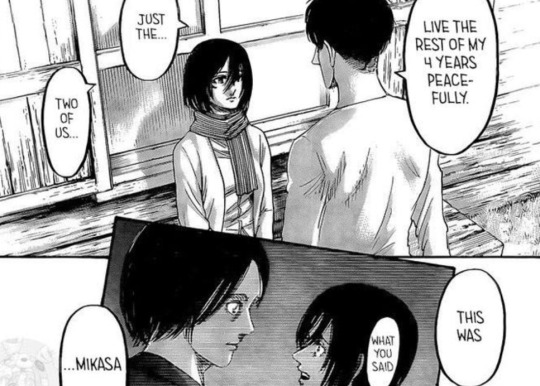
When Eren puts the decision on someone else, he can stop. Eren has feelings for Mikasa, but rather than confessing to her he makes her speak up about what her feelings are, even when everyone around him just, straight up tells him.
Why is he capable of stopping when it’s someone else’s choice?
In those cases, Eren succesfully avoids responsibility. When he makes the decision to run away in the possible alternate reality he’s doing what Mikasa wanted.
The other time is when he decides to accept the result of whatever Mikasa decides. In both cases, Eren rather than accept responsibility for his actions and the results of his actions, just, puts it all on Mikasa.

Is he doing this for Mikasa’s sake? To set Mikasa up as the hero of the world? No, he can’t even face Mikasa and explain himself or his feelings. Eren makes the choices to... put the ultimate decision on Mikasa, and run away without explaining himself because, that’s easier than taking repsonsibility for his choices. Every choice Eren makes, is to either make the conflict worse, because stirring the pot makes him feel powerful and in control, or throw control away to someonee else or some other reason (predestination whatnot) because he can’t bear the responsibility of what he’s doing. He wants to kill a bunch of people, but like... he doesn’t want to feel like a bad person about it (hence the excuse, he was doing it for his friends and yet later in the same conversation him saying that if he had killed his friends and they failed he still would have done it anyway).
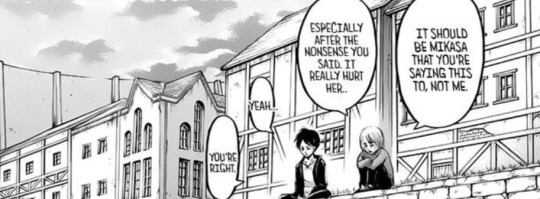
Therein lies the rub. Eren is not doing this for his friends, because he takes the one path that is guaranteed to take him out of their lives. He doesn’t do it for Mikasa because he does the one thing guaranteed to destroy her.
I love this girl so much, that I created this elaborate scenario where the only way she could save the world was to horribly behead me, the one family member left from her childhood after she spent her entire life trying to protect me from fear of losing her family - yeah that sounds completely insane.
It is meant to be. Eren is thinking jack all about what his friends are feeling. His feelings for Mikasa, his desire to keep her safe and away from everything else trump everything even the idea that his love might be returned. He loves at Mikasa. He’s not in love with her, he’s projecting his love upon her. “Why didn’t he just tell her about his feelings if he secretly loved her all this time?” the point was, he couldn’t. Eren’s ego isn’t developed enough to love another person, that requires actually caring about their feelings which Eren doesn’t do to well.
There’s a reason Eren and Mikasa’s connection keeps lingering back to the small kindness they showed each other as childhood,it’s because literally despite spending their entire lives growing up together, their connection hasn’t grown at all since then, because they can’t grown.
At the end of the series however, Mikasa makes the opposite coice of Eren. If Eren’s choice has been to remain a selfish child all this time, to make other people suffer rather than face his own hurt feelings. Mikasa makes the choice of selflessness, to grow up, beyond the child who loved Eren into the adult who knows that even if you love people, one day you might lose them.
Eren’s choices only ever make the conflict worse. Mikasa’s choice finally stopped the conflict that Eren kept accelerating. It didn’t save the world, it saved the world from Eren.
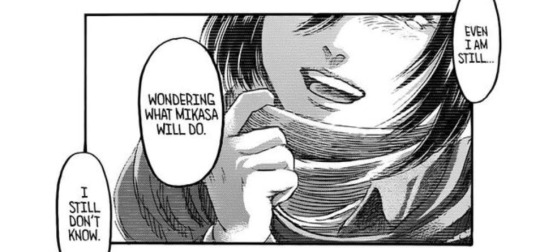
I think it’s important to remember that Eren didn’t see what MIkasa was going to do, that her actions were going to end up breaking the curse. He literally had no idea what was going to happena fter the massacre, all he saw was the massacre and decided to do what he could to bring it about.
“I did all of this for you guy.”

Backtracking, five seconds later, and making excuses it all would have happened anyway.
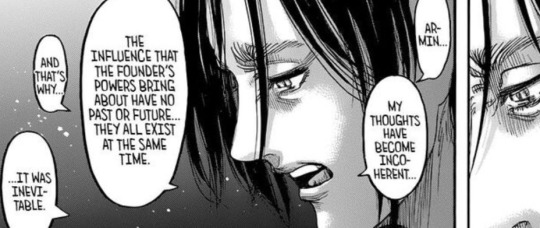
It’s the same behavior consistently shown throughout. Eren could have stopped. Eren did not stop. Afterwards, Eren wants to reconcile the guilt and believe that his motives were good, when his actions were the actions of a bad person. It’s the same as Reiner’s crying and begging after years of guilt and failure to reconcile his acitons with who he is. Eren can’t understand why he did what he did, he just knows he did it, and he can’t accept responsibility for any of it. So that’s why Eren throws the choice away.
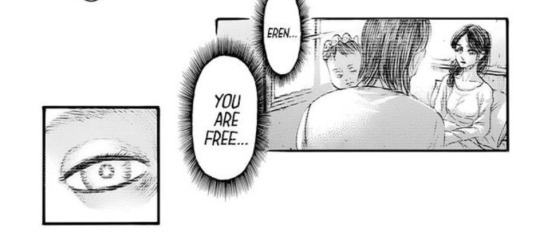
Eren can’t understand his father’s words, because in the end, being born, living his life, growing up, falling in love, making friends, losing some of those friends, growing older, getting weaker, all of those things are things Eren doesn’t want to do. Eren begins his life with “You were born into this world, you’re free to live hwoever you want” and ends his life wishing he was never born, and that’s the utlimate tragedy of his character arc. Not that it was inevitable he would eventually do these things, but beause it wasn’t and Eren chose to do them anyway instead of choosing literally anything else. Therefore, despite claiming Mikasa and Armin as the reason behind all of his actions, they weren’t, because he was inacapable of making the simple choice to be with them and grow up with them which is all they ever wanted from him.
#eren yaeger#eren jaeger#reiner braun#grisha jaeger#zeke jaeger#attack on titan#aot meta#attack on titan meta#aot 139#aot 139 spoilers#attack on titan spoilers#aot spoilers#snk meta#snk theory
777 notes
·
View notes
Text
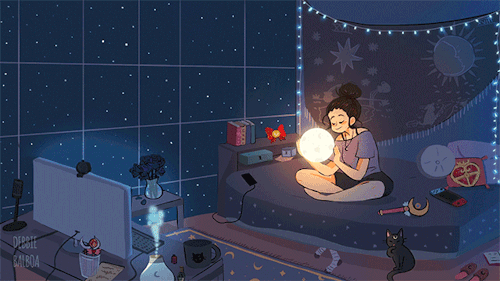
Lets talk: chakras!
in this post, we'll talk about chakras! what they are, why its important to keep them balanced and how they can aid/hinder our spiritual journey.
FAQs |
I. what even are chakras? Chakras points of energy throughout the body where the physical and higher selves meet.
II. what do they do? each chakra corresponds to massive nerve centers and major organs in the body. each of the 7 chakras also contains our spiritual states of being.
INTRODUCTION |
so what ARE the 7 chakras? glad you asked! let's break them down, one by one, because in order to begin to unblock or even open our chakras, we need to understand them throughly.
before we begin, let's do a little meditation lesson. lie down on a comfortable, flat surface. now, using your pendulum, hover over each of your chakra points — if the pendulum moves with the flow of the position of your body, the chakra is open. but if it does not move, it is blocked.
now, this comes with a grain of salt because while it can be a useful simple way to check the chakras, it cannot be the only way you check them.
SEVEN CHAKRAS |
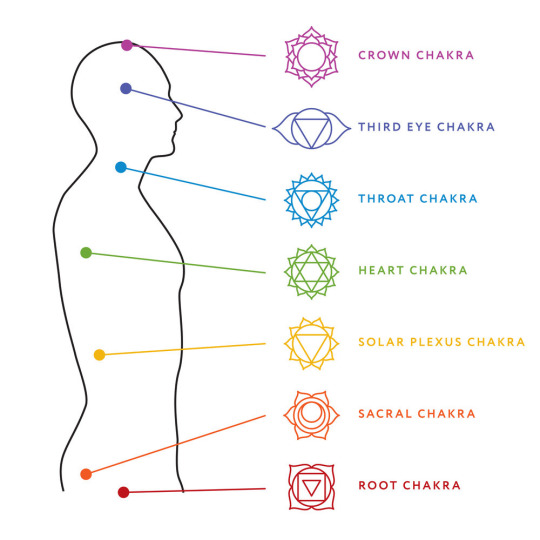
1. Root Chakra (Muladhara)
The root chakra represents our foundation. On the human body, it sits at the base of the spine and gives us the feeling of being grounded. When the root chakra is open, we feel confident in our ability to withstand challenges and stand on our own two feet. When it's blocked, we feel threatened, as if we're standing on unstable ground.
Location: Base of spine, in tailbone area
What it controls: Survival issues such as financial independence, money, and food
Mantra: "I can't grow from an unsteady foundation."
Color: Red
Element: Earth
Stone: Hematite
2. Sacral Chakra (Swadhisthana)
The sacral chakra helps inform how we relate to our emotions and the emotions of others. It also governs creativity and sexual energy. Those with a blocked sacral chakra could feel a lack of control in their lives.
Location: Lower abdomen, about 2 inches below the navel
What it controls: Your sense of abundance, well-being, pleasure, and sexuality
Mantra: "I always honor others but not before myself."
Color: Orange
Element: Water
Stone: Tiger's Eye
3. Solar Plexus Chakra (Manipura)
The third chakra, the solar plexus chakra, speaks to your ability to be confident and in control of your life. Think back to the last time you had butterflies or felt a pit in the stomach: That's the Manipura chakra at work. If your solar plexus chakra is blocked, you might feel overwhelming amounts of shame and self-doubt. Those with open sacral chakras are free to express their true selves.
Location: Upper abdomen in the stomach area
What it controls: Self-worth, self-confidence, and self-esteem
Mantra: "Self-love starts when I accept all parts of myself."
Color: Yellow
Element: Fire
Stone: Amber
4. Heart Chakra (Anahata)
The heart chakra is the bridge between the lower chakras (associated with materiality) and the upper chakras (associated with spirituality). As the name suggests, this chakra can influence our ability to give and receive love—from others and ourselves. Someone with a blocked heart chakra will have difficulty fully opening up to the people in their life. If someone's heart is open, they can experience deep compassion and empathy.
Location: Center of chest, just above the heart
What it controls: Love, joy, and inner peace
Mantra: "When I love myself, loving others comes easily."
Color: Green
Element: Air
Stone: Rose Quartz
5. Throat Chakra (Vishuddha)
The throat chakra gives voice to the heart chakra and controls our ability to communicate our personal power. When it's functioning at full capacity, it allows us to express ourselves truly and clearly. Someone with a blocked throat chakra will feel like they have trouble finding the words to say how they truly feel.
Location: Throat
What it controls: Communication, self-expression, and truth
Mantra: "I speak my truth, always."
Color: Light Blue/Turquoise
Element: Sound/Music
Stone: Aquamarine
6. Third-Eye Chakra (Ajna)
As we move up the body, we're getting closer to communion with the divine. The third-eye chakra controls our ability to see the big picture and connect to intuition. Think of it as the eye of the soul: It registers information beyond the surface level. Visions and intuitive hits are not uncommon for someone with an open third-eye chakra.
Location: Forehead between the eyes (also called the Brow Chakra)
What it controls: Intuition, imagination, and wisdom
Mantra: "I am open to exploring what cannot be seen."
Color: Dark Blue/Purple
Element: Light
Stone: Amethyst
7. Crown Chakra (Sahasrara)
The crown chakra, the highest chakra, sits at the crown of the head and represents our ability to be fully connected spiritually. When you fully open your crown chakra—something very few people ever do!—you're able to access a higher consciousness.
Location: The very top of the head
What it controls: Inner and outer beauty, spiritual connection
Lesson: "I am a vessel for love and light."
Color: Violet/White
Element: Divine Consciousness
Stone: Clear quartz
BLOCKED/OPEN |
now that we have a better understanding of the chakras, what they do and more important where they are, we can talk about the reasons we might have blocks, and the things we can do to reopen those blocks and therefore progress in our spiritual journies.
i read a book about charkas a while ago, and then i feel it explains the reasons better than i could, here is an excerpt from that book.
"A blocked chakra means energy is stuck or hindered. You might think of it as a blocked artery. In order for energy and information to flow, the channels through which they flow must be open. You will have difficulty getting to work on time if the roads are blocked by traffic. In the same way, the chakras cannot work at optimal levels when the pathways have blockages. These blockages can be physical, emotional or psychological, spiritual, karmic, or energetic.
The blocks can be physical, in the literal sense, such as fatty deposits in the arteries, a tumor, a cyst, or excess waste. We can create blockages in the physical body through poor dietary choices, lack of exercise, overexertion, and lifestyle choices such as overwork, drug use, or lack of sleep.
Blocks in the chakras can also be emotional or psychological, such as stored emotions from the past or mental illness such as anxiety, depression, or addiction. We accumulate emotional toxins and residue from not properly processing and digesting emotions and experiences. These toxins result in blocking the energy flow of the chakras.
Blocks can be spiritual in nature. They can come from outside spiritual forces or from within. If we refuse to honor the spiritual side of who we are, we block the higher chakras. Being spiritually rigid and strict can also restrict the flow of energy. Remember, whether the forces are external or internal, without your conscious awareness they can create harm.
Blockages can also come from our karma. The word karma in Sanskrit literally means “action.” In life we perform actions that are good or nourishing, bad or harmful, or neutral. An example of a good action might be giving money to charity. A bad action might be intentionally lying or deceiving. A neutral action might be making the bed (which, if you dig deeper, can also be considered a good action, depending on the circumstances). In the East, certain religions and philosophies adhere to the principle that we accumulate karma throughout lifetimes, and we carry it forth into our current life. The definition of karma, in this sense, assumes a belief in reincarnation and asserts that karma is not simply the action performed but also the consequences of that action. Good karma carried forward can give us favor in our current lifetime. Bad karma is a debt we must repay in this or future lifetimes.
Finally, the blocks can be energetic. I explained a little about energetic blockages when I spoke about my astrological chart. We are a part of this earth, our solar system, and the universe. The influence of the earth’s energy and elements, as well as of the energy of the sun, moon, and planets in our solar system, is strong and undeniable. Ayurveda, the five-thousand-year-old medical system from India, recognizes these energetic forces and acknowledges them as a means of healing. You can learn more about Ayurveda by reading my book The Wheel of Healing with Ayurveda: An Easy Guide to a Healthy Lifestyle. Ayurveda works on the principles of the five elements — space, air, fire, water, and earth — which work together to create the three doshas, or mind-body types, of Vata (space and air), Pitta (fire and water), and Kapha (water and earth). These elements and mind-body types are relevant in recognizing energetic blocks within your body and the chakras. This awareness will give you more tools toward your healing of the chakras and provide a superspeed highway to creating energy flow." — CHAKRA HEALING FOR VIBRANT ENERGY by Michelle S. Fondin.
so how do we unblock them then? well, its more complicated than can be explained in a single tumblr post, but i will tell you how to get the energies moving whilst you work through the blocks and figure them out.
we need to understand, that we are all different, and our spiritual journies will all be different. the same goes for things like chakras.
1st Chakra (Root)
Element: The root chakra is associated with earth, so walking barefoot in the sand, grass, or dirt can be beneficial. Any time spent in nature is helpful for this chakra.
Nutrition: Eat healthy red foods like tomatoes, beets, berries, and apples.
Wear and Decorate: Use accents of red and wear red jewelry, clothing, or shoes.
Sound: lam
2nd Chakra (Sacral)
Element: The sacral chakra is associated with water, which means swimming or spending time by bodies of water like lakes and oceans is beneficial.
Nutrition: Eat orange foods like carrots, oranges, melons, or mangoes.
Wear and Decorate: Surround yourself with orange accessories or tones.
Sound: vam
3rd Chakra (Solar Plexus)
Element: The solar plexus chakra is associated with the element of fire, so enjoy sitting around a bonfire or soak up bright sunlight.
Nutrition: Eat yellow foods like bananas, ginger, turmeric, pineapple, and corn.
Wear and Decorate: Wearing yellow clothing, jewelry, and accessories would be beneficial.
Sound: ram
4th Chakra (Heart)
Elements: The heart chakra is associated with air, so breathing deeply will help to clear the energy at this level. Drive with the windows open, fly a kite, or take a boat ride.
Nutrition: Eat green foods including broccoli, avocado, and leafy greens like kale or spinach.
Wear and Decorate: Accent your life with all shades of green.
Sound: yum
5th Chakra (Throat)
Element: The throat chakra is associated with ether (similar to spirit), so sitting in an open space under a clear sky is a fabulous way to get this energy flowing appropriately.
Nutrition: Eat blue foods like blueberries, currants, dragon fruit, and kelp.
Wear and Decorate: Use all blue tones.
Sound: ham
6th Chakra (Third Eye)
Element: The third eye chakra is associated with light. To balance and open this chakra, sit in stillness in the sunlight or relax in a window as the sun pours in.
Nutrition: Eat indigo foods including purple kale, grapes, and blackberries.
Wear and Decorate: Wearing indigo clothing or jewelry and decorating with accents of this color will be useful.
Sound: sham
7th Chakra (Crown)
Element: The crown chakra is affiliated with all the elements, so connecting with your wholeness rather than a single element is the recommended practice. Spend time in meditation, chanting, or prayer.
Nutrition: At this level, the nutrition is no longer for the physical body. This chakra is not nourished with food, but with spiritual practices. Practice self-reflection and curiosity.
Wear and Decorate: Wearing violet clothing or jewelry and decorating with accents of this color will be useful.
Sound: om
CONCLUSION |
hopefully you all understand chakras a bit better now! but, if any questions are to come up that you can't seem to find an answer to, my ask box is always open! (like my chakras).
2K notes
·
View notes
Note
why does jean warn up to mc so quickly? ikevamp makes it clear that jean is a pretty reserved person and doesn't open up or let people in easily but he seems to let mc in quite quickly and it confuses me quite a bit.
Oh boy, where to begin with this one.
Well, I have a lot of Feelings^TM about this, but I'll try to be concise. Essentially, I think Jeanne doesn't recover in the other routes--or the general storyline--largely because he's just a lot to unpack narratively speaking. And without some pretty direct intervention, he has a hard time healing. MC’s direct intervention was meaningful because it was focused, consistent, and adapted to Jeanne’s specific needs. She also doesn’t make light of his experiences which is key; she fully understands that she can’t fathom what he’s been through. There is a very weighty respect and acknowledgement, a seriousness with which she treats his wounds that’s important.
It’s easy to make this a “why is MC nOt LiKe ThE oThEr GiRlS” but honestly that’s just not the sense I get when I look at all the information available to us.
That being said, I also just feel like every person's recovery from traumatic events doesn't really look the same? I mean Leonardo’s cptsd isn’t going to operate the same way Jeanne’s wartime/Inquisition cptsd is going to operate. Some people require very individualized healing, others will often require a large scale group effort to lift them up.
Typically people don't ever just get over what happened to them and never worry about it again, either. It's usually a process of coping; the hope is that with time you find healthy ways to deal with grief and move forward. Therapists aren't magicians, they just help people process painful experiences/thoughts. It's honestly up to individuals to find meaningful ways to implement these tactics.
Tl; dr: My contention is that Jeanne doesn’t open up or choose to stay alive because MC magically heals him, rather his recovery is a convergence of many people’s efforts and hopes that he stays alive. Gilles (he insists that Jeanne must live, asks him to promise), MC (affirms and bolsters that promise), Comte (makes a second life and recovery possible)--and in no small measure Mozart and Napoleon--all make an active effort to buoy him. As people often say, it takes a village to raise a child.
While Jeanne seems to respond most powerfully to MC’s attempts, it feels more like a product of chemistry/compatibility than it does a random cop out. There is no insinuation that only romantic love can heal; after all, MC gets close to him without any romantic intentions at first. They’re just good friends? It’s more that their feelings simply moved in a different direction after a point, which doesn’t necessarily happen all the time. Jeanne is also incredibly moved by Mozart’s love for him as a friend, Comte’s love for him as a father, and even Gilles’ love as a comrade to an extent. If anything, without their input Jeanne’s capacity for romantic love would be questionable at best.
Now, because I can never for the life of me stop analyzing, I have a more large scale outline of my thoughts below. Spoilers for Jeanne’s route:
If we look at Jeanne's life history, he has pretty specific trauma. Most of the harm he endured was a direct result of human rights violations after the war itself. He didn't enjoy fighting and killing people, but he's also very much a man that sees the reality of his position: it's either kill or be killed. His entire goal was to defeat the enemy as efficiently as possible in the hopes of ending conflict, and with his enormous resolve turns the tide. He had no innate interest in inflicting harm, or lack of control when engaging. He isn't pathological about it, and doesn’t dehumanize the other side. He was more "this was an act of necessity, but those are still human beings." So as far as I can tell he has a very strong moral compass and sense of duty, he doesn't show much delusion/confusion in that regard. (Also evident in his conversations with the young orphan boy.) Furthermore, he has been shown to have a sense of humor--cracking jokes with Gilles and boosting morale for his fellow soldiers.
His childhood abandonment is significant (he left his home because he was "not an adequate farmhand and they had no ability to feed all their children") but I don't know if I would consider it a huge trauma point for him. It seems as though he deemed it an act of necessity--not spite. It was simply the way of things, and he couldn't help his wiry constitution. You'd be surprised how common that was once upon a time, tbh... While it's certainly not right or fair, it does appear that in his perception it was the choice he made and he moved on after he became a soldier. Just focusing on what he could do, rather than everything he lacked. For people in his position, they often feel it is useless to linger on what should have been. There’s no time to linger or doubt, life hangs in the balance.
That leaves us with his time under the Inquisition, just before he was slated to be burned alive. I think this is the keystone trauma point for him, because there are a lot of moving parts to his powerlessness here. The first part is that his entire life's mission--ending the war so that people would no longer have to die and/or starve as a result of senseless violence--was just sabotaged. All those years of doing things he never wanted to do (wartime violence) and being forced to leave his family to ensure they didn't all starve, all of it treated like some kind of joke. Like he didn't sacrifice years of his life and sanity to protect a people who were happy to call him a monster and watch him burn alive. The second part is the overt gaslighting and rewriting of Jeanne's personal history (and overall French public perception) for the sake of the King's political agenda. To call him a treasonous danger to the country when he was once lauded a hero. The third portion is the actual physical helplessness of being arrested, starved, and continuously maimed for no reason beyond pure malice. While it's never right to do that to any human being, this was done to a man who prided himself on his stalwart moral code. To abuse and torture him for something egregious that he would never do (at the risk of death) is just another slap in the face to everything he is and believes in.
I just feel like the context clarifies why that period of time would be the tipping point. His entire moral code and life’s work is being called into question and swept aside, as well as his agency? He believes very powerfully in a sense of right vs wrong, what's fair and what isn't fair. Somebody else deciding that for him--and deciding in a way that is openly unfair/incorrect--further makes him lose himself and his sense of reality. A person in that situation begins to doubt if they are good or bad. His belief in god all the more pressing; if he was a good person, why would fate bring him so much suffering? Honorable soldier or not, his blade has drawn so much blood...
People often reference his stilted social skills (and I am of the belief that he is on the autistic spectrum) as a reason why he is so "people-adverse" but tbh? I don't agree. His memories before the onset of this trauma reveal that he was actually a very warm person, and that people were more than willing to fight under his banner. He had friends, and he had comrades--his country loved him. He was the picture of well-meaning civic duty. Just because he doesn’t integrate smoothly into larger social groups or adapt well to socially shifting circumstances, doesn’t mean he just hates people lmao. When people give him the space to exist within his comfort zone and don’t take advantage of him, he thrives. Compounded by that, we also have his actions in the present to further prove what is true and what isn't.
While he is stern with the orphan boy (I'm sorry I can't remember his name, damn it) there is no malice or cruelty in what he has to say. He doesn't punish the kid or do anything out of line. It may not be fair in terms of the adult level of discretion he asks of him, but the kid also didn't have a lot of options realistically speaking lmao. Same thing with MC, she and the orphan boy are nearly identical in how Jeanne treats them. He's a little rough, but the route reveals that his intentions are just a reflection of what he's been through. He truly believes that if a person isn't strong, they won't survive--because his entire life was a series of trying to be strong/reliable because nobody else would. There was nobody to protect him, and nobody to care for him went things went south. It was him and his sword against the world, and even his exceptional skill as a fighter did not protect him from the Inquisition's arbitrary torture. He has lived in a world where good acts can become absolutely meaningless, where following rules and helping people still gets you slaughtered. That's going to take a considerable toll on his mental health: where do you find the will to go on when the next second of your life could mean the devastation of everything that matters to you?
Spoilers: you don't. Or if you do, every minute of the day is a fight to stay alive. That is the point at which we meet Jeanne. Caught in the hellish whirlpool of wanting more, wanting better--but being terrified of the cost. The cost of hoping, only for his entire world to go up in flames again. It's not a small thing, in my view.
If you have any doubts as to whether or not that is the case, I direct you to literally every singular instance in which Jeanne's emotional sensibility goes visibly dark/south. When do these instances happen? When it rains, for one. And when Shakespeare deliberately starts pressing on his sensitivities: about the soldiers he was forced to kill, about the nation that spurned him, how he's truly "wicked" at heart and doesn't deserve to be happy--seconds before flames erupt for the festival. Does that really sound coincidental? I mean lmao. The rain is a painful reminder, but MC transforms that memory into something a little lighter with her bet. He has nothing to lose in her game, all she does is ask for time with him or offers him something if she loses. There's a playfulness there, a restoration of agency and ease that's invaluable to his recovery.
As for Shakespeare's deliberate retraumatization...I can't even begin to explain how damaging that event was. Shakespeare is undermining Jeanne's agency in that he--not unlike the corrupt monarch of Jeanne's era--is twisting Jeanne's beliefs to work against him. He knows full well that Jeanne doesn't feel like he deserves somebody so bright and understanding (we need to remember it's not really a luxury he's had much in life, especially after the war ended). He knows Jeanne has a tendency to impose that strict moral code on himself even more than he does on others. To reaffirm his every worst fear and lurking terror only throws Jeanne into a vicious downspiral. Jeanne doesn't reject MC out of disgust or hate. He rejects her because he literally cannot handle the concept of trying to be happy again, or of burdening her with his constant struggle to move on while he’s in the middle of a bad episode. He knows he won’t be able to stop reliving the past, that every second of his life and breath will be colored by his gruesome memories. He's trying as hard as he can to keep the intrusive thoughts quiet, to move on. But I'm not going to lie to any of you, that is incredibly difficult to do alone.
The next obvious question is, well why can't the other men help him? This isn't to say that they can't--we see how much solace Jeanne finds in Napoleon and Mozart. Even Isaac is gentle with the veteran. But there are limits to how much they can do. Napoleon is struggling with his own wartime trauma, and it's not identical to Jeanne's. Plus there’s a distinct difference in their sensibilities? Napoleon is the type to habitually seek comfort in helping others when he can't help himself, he's not as in tune with answering his own personal feelings and regulating them. (I mean just look at his new ES: he knows what he wants, but it takes a nudge from Isaac for him to go through with it.) He’s very communally reliant in ways Jeanne isn’t; Jeanne is a very private person, and typically prefers one on one from what I can tell.
Mozart is the definition of repression, and if you look at their interactions it's usually Jeanne that's smoothing over Mozart's rough edges. Mozart says as much himself: that he feels like a rotten friend because he knew Jeanne was struggling with a lot of intense trauma, but he didn't know how to unravel it without hurting him in the process. Mozart calls it personal cowardice, but honestly I just feel like they both had too much going on to be able to help each other effectively. (And Jeanne expresses this sentiment too? This idea that he's not angry with Mozart? He knows they're both carrying a lot, he's just touched Mozart cares about him in return.)
Okay, briefly unrelated, but like. Am I the only one that wheezes uncontrollably when Mozart is like "?????? Idk what it is about MC...I don't want her to be scared of me..." in his own main story in the baths. And Jeanne. IS TRYING SO HARD. NOT TO SPILL THE BEANS ABOUT HIM O B V I O U S L Y BEING IN LOVE. THE HILARITY I CAN'T DO THIS. Jeanne was like "yeah....yeah that's rough buddy.......[screams internally, give your boy time Jeanne he's fragile]"
Honestly? That's the thing about Jeanne too--he has incredible self-awareness and hyperarousal-related (I mean the PTSD kind, get your head out of the gutter) awareness to the people around him. He's very, very conscious of the fact that he is surrounded by geniuses when he can't even write his own name. Just because he has the fortitude not to lash out with his insecurities, doesn't mean he never feels stupid or inferior. And it doesn't help when there are people in the mansion who call him--a fucking war veteran from 500 YEARS AGO--nAiVe. He's not naive lmao. He just doesn't know how the world works so many years later, and it's a ridiculously steep learning curve? Leonardo and Comte are nearly 500 years old, but they lived throughout every hour of that time in a linear fashion. It is a big deal to be moved from 1430 to 1890 in the span of a second asynchronously, and then be expected to function without a hitch??? Given the circumstances he adapts well.
That atmosphere--this constant impatience with what he doesn’t understand, his inability to be caught up to speed quickly--is going to hinder his recovery lmao. He feels like a burden most of the time, and agency and freedom are crucial.
Another thing that occurs to me about the mansion's arrangement is that there is a power dynamic, just as any space with people in it has some level of hierarchy (unless you live with miraculously chill people). Jeanne is acutely aware that Comte is the most powerful being in that space, and he is not only hatefully angry at him--but likely afraid too. We have to remember that the biggest betrayal he witnessed in his life was at the hands of a monarch; it was the aristocracy that turned on him and erased the truth. Comte is openly a child that resulted from both that era and that type of lineage, I don't really blame Jeanne for being wary. He intimately knows how willing rich people are to throw normal folks under the bus to suit their ambitions/whims. Comte, while not deliberately threatening, also seems to be painfully aware of this impression he gives off. His "chad persona" as I've mentioned allows him to navigate his life in secret by necessity, but it’s actively damaging to his son. He can't reveal the truth because of Vlad's betrayal, and he's openly unsettled by what it could mean to be honest. Will they wonder about Vlad and find themselves ensnared under his mind control as Charles and Shakespeare are? Will Comte himself be subjected to the mortifying ordeal of being known only to lose them?? That's a risk he isn't willing to take--and that leaves him in a double bind.
What is it that they say, the truth will set you free? This is where MC and Comte come into enormous play when it comes to Jeanne's recovery. One thing to keep in mind is that most of the people in the mansion have their own traumas they're trying to carry, and I feel like a lot of them are unsure how to approach Jeanne. Or if they do, he's very guarded. It takes a lot of consistent effort to get through to him. What does MC do when Jeanne unleashes his harsh worldview on her? She's understandably frightened, but Jeanne isn't malicious (so she chases him around). In fact, he openly avoids and runs away from her--well aware that what he's done is wrong. If anything, he did it on purpose, bringing us right back to Shakespeare's verbal undoing; why does Jeanne attack her in the first place?
LMAO. He attacks her because she essentially says "oh thanks for helping me!" "I am not nice. Watch yourself." "But you seem like a nice guy to me?" "REEEEEE" Does the pattern become a little clearer? When people think kindly of him, his instinct is to shatter that illusion with an impulsive reprehensible act. When people think poorly of him or lash out, what does he do? When that orphan boy starts yelling and screaming, Jeanne is nothing but calm. He explains the situation, and offers the kid a choice, perfectly happy to be the bearer of bad news. This operates on many levels I’m sure, but I have a feeling it has something to do with him being hailed a saint and a war hero only to be tortured and branded a monstrosity (and he probably thinks being a vampire is doubly monstrous). He’s more comfortable being hated because he feels it’s what he deserves in a lot of ways.
Jeanne has a lot of internalized self-hatred because of what he's done, and because of how much harm was inflicted on him outside of his control (he's Catholic and he was tortured, come on this writes itself). If I'm honest, I think that's actually the greater part of why he hates Comte lmao. Comte refuses the very concept of being cruel no matter how much Jeanne lashes out. Sure he lectures him and scolds him, but he never actively limits what's important to him or controls or harms him. Comte fully realizes the tragedy of how Jeanne's life was used by a nation in dire straits, and knows he needs time and acceptance to heal. No matter how dismal or unhappy, Comte doesn't stop--he fully believes Jeanne should have time in his life where he can really live for himself for once. But therein lies the issue, Jeanne doesn't know how to live for himself.
Which brings me to how MC and Comte "heal" Jeanne. I feel like they give him the space he needs to recover, and that's what results in his gentled temperament and happiness. Remember that so much of his main story is MC endlessly chasing after Jeanne. No amounts of his hissing or running or threatening stops her. Even if his refusals are empty of real dislike, they're enough to deter most people. Not MC. She's able to see through to the depths of who he is, and doesn't just use him for her own ends? She actively seeks to teach him (to read and write) to help him settle better in this era, she actively tries to ease his distaste for rain with a well-meaning bet, and she never gives up on him. (Actions mean so much more to him than words in general too, tbh...). Love is more easily defined by work and effort than it is by attraction.
When he has his episode at the festival, sure she's rattled; but that's because she truly believed that he didn't want to be around her anymore. When she notices he really doesn’t want to be followed, she stops like any normal person would. It’s only when she reads his notebook and sees the truth for herself (that he’s given up despite having the same feelings for her) that her determination is rekindled. She doesn't approach him fearfully, doesn't treat him like he's made of glass either. She just wants him as he is--accepts and loves him as he is. Scarred, bloody, exhausted, abrasive, terrified. She doesn't define him by how easy he is to love. That is a huge issue with traumatized people lmao. Because of their maturity, people always just assume they don't need help, or they rely on them to an extent that isn't sustainable. The second they reveal need or that they struggle, people walk away or victim blame them because it’s easier than taking them seriously.
While MC's attempts may be a little more obvious (cherishing his lily field, wearing the hair pin he gave her, careful about his gruesome injury, really listens when he talks about the horrors of his life and accepts that he experienced a level of agony/terror she can never understand, tries to express her feelings no matter his evasion) I think it's also important to consider Comte's large scale effort. I don't say this to undermine MC, I say it because Jeanne's life was defined by a complete lack of security. He left his parents to make their lives easier, he lived in a war that meant life or death any second, and his country's leader branded him a traitor which lead to his endless torture and public execution. Jeanne does not know a life in which safety is the norm. Point blank. He does not understanding going outside and not expecting the worst anymore.
Comte not only understands that level of despair, but treats it with dignity and respect. He fully accepts being hated if it means Jeanne can use that hatred to live on and find a way to heal. And most importantly, when Jeanne begins to move forward with MC and Mozart's help, Comte never once holds it against Jeanne when the truth is revealed. He's not angry, this isn't about reprisal or reparations or revenge. It's just love.
Jeanne doesn't really have a concept of this? His entire life was mostly transactional, defined by strength and efficiency. Nobody gives a damn about your feelings. You either hurl yourself at the problem or die. Nobody is going to help you or carry you or save you. While he may have had a little more support while he was in the military from his fellow soldiers, that support system was ripped away from him during the Inquisition.
One very common sentiment regarding elongated imprisonment and torture is that survival occurs in pairs. It is an undeniable fact that people need others to survive. It is the nature of who we are. Individualism has never proven to be successful, or if it is, its dividends are astronomically minimal when compared to people working together.
What does it mean to be the most reliable, steady person in the room? Usually it just means you don't know how to ask for help when you are no longer capable of maintaining that stance. Napoleon is guilty of it. Leonardo, Comte, and Jeanne all are too. It's part of why MC and Comte's capacity to see what he needs and provide as much as they can is such a big deal. That sort of consistent support (without a constant necessity to beg for help) allows Jeanne to be able to re-integrate into his new reality and find joy. Even if his nightmares and memories never go away, they are now being actively overrun by positive experiences. That's the thing about recovery, really--it tends to be more about drowning out the negative as much as possible and coming to terms with it, than it is about forgetting or never feeling it again. It’s about softening the sharp edges of pain like sea glass.
So is MC magical and randomly got Jeanne to open up? Nah, I don't think so. I think it was a series of persistence and real acceptance of who he is that made him warm up. People really seem to underestimate how deeply affecting understanding is, but that's how damage is undone. Jeanne can't really linger on the idea of his own monstrousness, his unworthiness, a lifetime of misery, when the person in front of him actively listens and cares about him. Makes him laugh and smile and lose himself in warmth for the first time.
If I'm honest, I feel like people also just...underestimate the level of traumatic resurgence that's perpetuated and inflicted by society’s standards in general lmao. This rhetorical structure in which good and bad exist in moral extremes, this idea that people should be able to recover and never experience relapses or periods of sensitivity. The refusal to radically listen to people and their problems, and make active attempts--not matter how small--to mend/ease those hurt feelings. Granted there will always be people in the world who do not want to improve, but I feel like most people want to. It's hopelessness, silence, and stigmatization that remain the true enemies of traumatized/mentally ill people everywhere. And among that population are always war veterans...
#ikevamp#ikemen vampire#ikevamp jean#ikevamp jeanne#ikevamp meta#ikevamp saint germain#ikevamp comte#sorry i have a lot of feelings about this topic kjahsflkjhsjkghfd#but yes!#i think mc being able to help him was more about her sensibility and the mental fortitude/space to be able to care about him as he needed#i don't think it's necessarily that she's SpEcIaL#trauma is a sensitive subject--especially considering he's a war veteran#but i also think it's simple and complex at the same time#simple in the sense that people really do just need consistent support and love to be able to care for themselves again#complex in the sense that support can come in so many permutations and some of them are very delicate and multi-faceted#and thus must be handled with extreme caution in some regards#anywho not that i'm any kind of expert this is just what i understand and see#also in case it wasn't clear i love him and cry every day (look away comte it's my whoring hours)#though i hope this helps??? i went off harder than anticipated lakjhglkj#thank you for the ask!!! <3333#asks#rambles#not incorrect quotes
94 notes
·
View notes
Text
I started typing this in the tags of this post, and it got too long, and then I was going to just reblog the post with this as an addition but that got too long too, and I've been meaning to make a post addressing free will vs. predestination since the premiere anyway, so - here we go. Spoilers, obviously.
Cut for length and spoilers. Please blacklist #loki tv series spoilers, #loki series spoilers, and #loki spoilers.
This is kinda rough and I'm not sure it actually makes any sense but I'm posting it anyway.
I realize that the post is a joke, obviously (and it is hilarious) but I started thinking about the implications and couldn't stop because it's honestly a goldmine of existential reflection and an inevitable crisis or three.
Let's look at a scenario.
Say you're late to work for reasons totally beyond your control: your neighbor stopped you to ask a question on your way out the door; you swung through the drive-thru for a quick coffee but the person in front of you is ordering a full continental breakfast ffs (this happened to me this morning); there was an explosion and then the Winter Soldier randomly dropped from the sky and landed on the hood of your car. Whatever. Shit happens.
So you're late, but on this particular day, your lateness somehow has consequences that lead to and create a nexus event and the next thing you know, you're being arrested, tried, convicted of time crimes and ultimately (a version of you is) erased from existence.
And this is if it's not even your fault you're late.
Now say that you're late and it is your fault. You took a new route on a whim and drove a little more slowly because you passed a particularly pretty meadow; you hit the brakes at a yellow light instead of speeding through bc you wanted the quick chance to check your email; you sat in your car for a few extra minutes in the parking lot, because maybe your job sucks and you really needed those extra minutes today to psyche yourself up into getting out of the car and going inside and clocking in.
These little choices are you exercising your free will. Because to me, free will is all or nothing - it doesn't just apply to the big decisions.
On the other hand, predestination means that regardless of the choices you make or if it's a big decision or not, everything you do is ultimately going to lead you to a set point or position or place (your destiny).
And I can kind of look at it like a GPS - that is, there are a number of "insignificant" choices you could make and they will still lead you to where you're predestined to go. Like how a GPS will reconfigure your route if you miss your exit on the highway. It doesn't matter if you took Route A or Route B, you're still going to end up at your destination.
But say sometimes the route does matter. Say that there are certain scenarios in which there's only one road (for example, 14 million losses vs 1 win) and you can only get on it by following a specific series of events and what determines the ultimate outcome is whether or not you're late to work that day.
If you decide to wait those extra five minutes in the parking lot, that means that you weren't in your cubicle at 9:03 when Stanley from Accounting wandered by with his giant stack of papers, and when Mary Sue said hello to him, he got distracted and tried to wave and ended up dropping those papers. Had you been at your cubicle, you'd have swooped down to help him but since you weren't there, Stanley is crouched on the floor alone and doesn't notice Joe coming at him with a paper trolley so when he stands up, he and Joe collide and Stanley loses his balance and goes face-first toward the trolley and breaks his nose when he hits the metal handle on his way down.
Now Stanley has to go to the hospital to get his nose set because you wanted to sit in your car and spend five extra minutes hating your life that morning.
If the sacred timeline says that Stanley is supposed to be in that ER at that specific time on that specific day, and no other set of circumstances would get him there, because this will ultimately take Stanley down the road to whatever greater journey he's supposed to go on, then it has to happen. But say you exercise your free will and decide not to wait those five minutes, because the free will applies to every choice you make, even the tiny, insignificant ones. You chose to put on your big person pants and took a deep breath and just head inside - and because you chose to do that and because you were at your cubicle to help Stanley with his papers, Stanley never ends up in the ER and the timeline that's supposed to happen is suddenly at risk and the TVA has to get involved (I assume).
So having free will introduces way, way too many variables into a fixed timeline to ever keep track, because you're taking these tiny, seemingly insignificant choices that people are making every minute of every day, and you're multiplying them by trillions of sentient beings in the universe, and you're saying the fate of the timeline and reality itself depends on all of these beings either always making the choice they're supposed to make or constantly sending the TVA out whenever they don't.
It's fair to conclude, then, that both free will and a fixed, single timeline can't exist at the same time. Either you adhere to the fixed timeline and everyone does exactly what they're supposed to do every second of every minute of existence, or you have free will and autonomy over all of your decisions, no matter how big or small, and those decisions can result in a number of outcomes, ultimately leading you to one of several possible destinations.
Case in point: Tony didn't have to snap his fingers in Endgame. He chose to. Had he not, Thanos would have won. It doesn't matter if there was one way to victory or 14 million ways to failure; the timeline could ultimately only go one of two ways and the choice Tony willingly made determined that Thanos lost. It wasn't predetermined because if Tony had not chosen to snap his fingers, the timeline would have gone the other way.
My personal belief - and this isn't necessarily for the MCU, but in general - is that we do possess free will and the future is ever shifting and changing because nothing is written in stone. It holds up against most, if not all, of the world's belief systems. For example, if you believe that people have guardian angels, the rule is generally that your guardian angels can help you but you have to ask them; they can't decide to intervene without your permission because to do so would infringe upon your free will.
Similarly, you can go on etsy and pay $5 for a funsies psychic reading or pay a lot more money for an in-depth, specific tarot reading and both will tell you that the outcomes may change depending on the paths you take, and that their ultimate advice is for you to keep your focus on your goals and your own self so that you can be subconsciously manifesting the best possible future for yourself. (Not that I know this from experience. It was one time. It was a few times. My point stands, and also stop judging me.)
To get back to the MCU, though - if you determine that both a single, fixed timeline and free will can't simultaneously exist, and your ultimate purpose is upholding said timeline and not letting anyone fuck it up, lest it break off into lots of different branches, then it poses a pretty serious moral and/or ethical question of - who decides what choices we make and what paths we're destined for? The time lizards? Who gave them that authority? Did anyone, or did they just manifest themselves into existence one day, create the universe, and then decide all of the rules (and, if so, where does that leave the norns and the gods and other super powerful beings who are generally thought to be in charge of things)?
If free will doesn't exist and everyone is acting based on what has been predetermined for them by some higher being (or, in this case, time lizards), it takes away our autonomy, and if everything we do and every single tiny step we take is decided for us, what makes us any different than cogs in a machine just following orders? What separates us from robots?
Speaking of robots, it's interesting to me that the TVA's screening process (if you can call it that) has a failsafe against robots specifically. Any robot that might come through is destroyed immediately and in this case, “not a robot” is defined, more or less, as a sentient being that possesses a soul. What does the TVA have against robots if their ultimate goal is ensuring that the robotic machinations of the time lizards are consistently carried out to protect the sacred timeline?
A soul makes you human; the energy of the soul is what you, at the core, are. It can be assumed that having a soul also means that you have some sort of moral and ethical code by which you live your life but, if you don't also have free will, then what is the point of possessing a soul and a moral and ethical code?
Loki is a villain and he's told by Mobius, the TVA, Odin, and pretty much everyone who ever meets him that the only thing he's good for - the only reason he exists - is to cause pain and suffering and death. This has been predetermined for him; this is not his fault and he did not choose it. And every single choice he makes has either already been destined as the choice he was supposed to make, or will be pruned so it won't grow into the wrong timeline. Ultimately Loki can change neither his final destination, nor the purpose and meaning of his existence.
Which leads me to the theory that the several Loki variants that the TVA keeps coming across are the result of Loki consistently resisting against his predetermined path; he's trying to find the timeline where he is able to latch onto and keep his own free will in defiance of the timekeepers but, so far, he hasn't been successful. This could segue into why the current Variant is now going scorched earth and just obliterating the main timeline completely - because if there is no sacred timeline, there's nothing dictating who or what Loki can be, and free will is regained. If there's a multiverse that branches and branches beyond anyone's control, then there must be a branch in there, somewhere, where Loki can exist on his own terms and decide how his own story goes.
This also might be a theory for why Loki is already setting his sights on taking over the TVA (assuming that's not just something he told the variant for reasons). But my original point in delving into all this is to ask: if Loki is predestined to always be a villain whose story plays out exactly the same way because that's what's supposed to happen, then how can anyone ever hold his misdeeds against him? He's literally just existing as the timekeepers decided he would exist and everyone is blaming him for it.
And this leads me to ask, as well, if one's soul is generally good, and one possesses more good traits than bad, what is the logic in making them exist only for pain and destruction? If it's for a greater good, then it stands to reason Loki is not the only one predestined for misery, and what greater good could come from all that suffering?
Conclusion: the existence of the TVA as an organization means that there is one fixed, sacred timeline but the existence of said timeline is immoral and unethical because it means no one actually has any free will at all in the MCU. The very notion of heroes and villains is pointless because it has nothing to do with your own qualities or morality, it's literally the luck of the draw. In order to have free will, the sacred timeline has to be destroyed, and so my prediction is that the Big Bad of the Loki series is not the TVA and not the time keepers but the actual timeline itself, and the entire fate of the MCU rests on whether or not Loki can ultimately succeed.
Also, don't be late for work.
#well this was a journey#smfh#i hope it at least makes *some* sense#loki series meta#loki tv series spoilers#loki series spoilers#loki spoilers#long post#i should have revised this before posting lmao#i went back and edited some of it but meh#it's pretty nonsensical i think but also i confuse myself really easily so
42 notes
·
View notes
Text
Sacrifice for the Three Lords
So. Got curious about something.
Curious thing got long lol, under the cut
The word sacrifice has a very loaded, very intentional feel to it. For something to be sacrificed, it must be considered less than whatever it is being sacrificed for, whether in the moment or in the long term - it’s the logical conclusion to the act itself. Even if regret for that choice can come later, at the time you are sacrificing whatever is being sacrificed, it is considered less (for example, spending an hour of your time for a stupid meme post you spent too much time on, for a light-hearted start. In hindsight you might think it was stupid or not worth it, but at the time of bungling around in photoshop you considered the time lost as a worthwhile sacrifice to your end product).
With that in mind, how do the three lords view sacrifice? When is it mentioned in their routes? When do they themselves mention it, and what are they pertaining to when they do? I want to focus on the word “sacrifice” specifically, due to the already mentioned connotations and meaning attached to this word in particular
We’ll start with Claude, with his route’s first mention of the word sacrifice being, and I’m not kidding, post ts, at Ailell
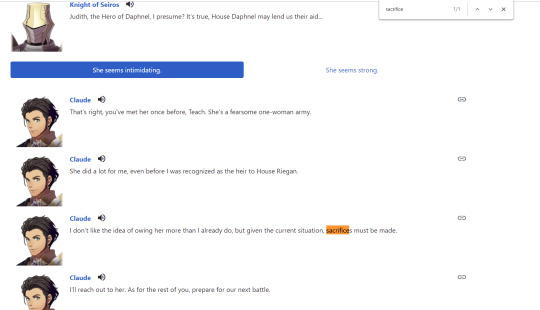
What is being sacrificed here is Claude’s independence from Judith. He is expressing a want to not rely on Judith’s help once again but needing to give up that want in order to move on with his goals of winning the war. This is something that he alone is sacrificing with no involvement or need of sacrifice from anyone else - he is the only one losing something from this sacrifice.
The next mention is from Hubert’s letter

The sacrifice being mentioned belongs to Edelgard. Hubert is stating that Edelgard has made sacrifices that must be honored, heavily implying that they were necessary for her goals if they hold such importance as to keep that importance beyond the grave to be passed by those who have defeated her. Claude himself is not sacrificing anything, nor does he state any agreeance to the phrasing used here, but he has said earlier that her methods use too much bloodshed for people to rally behind, implying a disagreeance.
This is the last time the word sacrifice is used in direct relation to Claude. When it comes to all that has happened to others, Claude specifically does not refer to it as something like a sacrifice that he is making.
Though that does not the word is not used further in VW. Dorothea, in VW:

The sacrifice being made here is deliberate and willing on the part of Count Bergliez. He is making the consenting, thoughtful decision to sacrifice himself because he views his men’s lives as more important than his own, and it is implied that his doing so achieved the desired outcome (the safety of his men). He came to this decision by himself, with no outside force making him do this (outside of the circumstances that prompted it - no one person made him do this). The act of sacrificing yourself for the lives of others is portrayed in a explicitly “positive” light coated in tragedy and even then only if it achieved its goal
Lastly, for unique mentions on VW, Annette:
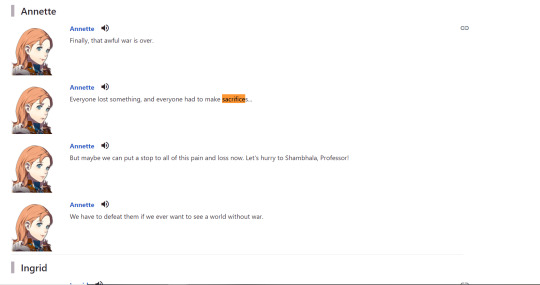
Forced sacrifice is seen as something painful. The making of circumstances where sacrifices must be made outside of the will of those making it is portrayed in a explicitly negative light that is sought to be rid of.
In VW, Claude himself never refers to the loss of life as a sacrifice, and only ever refers to something as a sacrifice when it is him making it in a way that does not affect others. Sacrifice of life is only referred to as “positive” when either 1) Hubert, an amoral character who cannot be part of VW, makes mention of it, or 2) it is the singular sacrifice of one person’s life that they made of their own volition in order to save others, and even then it is portrayed in its context and in later contexts as a tragic event nonetheless
Next: AM
The first mention of the word sacrifice for AM - or in this case, BL - is after Lonato:
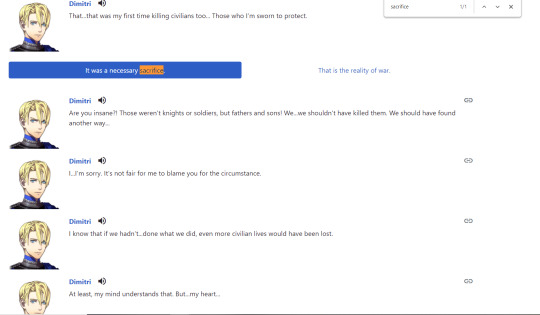
The word sacrifice is not brought up by Dimitri. Byleth says that the loss of life must be accepted, the result of which is explicit denial from Dimitri of the supposed importance of sacrificing civilians. Sacrifice of life -and the direct phrasing of it as a sacrifice - is explicitly portrayed as bad in the eyes of Dimitri; he does not believe that life ought to be sacrificed to achieve one’s goals
Next time, post ts:

The sacrifice of lives is directly, verbatim described as needless. The concept of the idea of lives being less worthy than a cause is explicitly called wrong. Human life is given more value than any goal.
Note how this is a direct reference to his behavior in VW, where he sacrifices his life as well as those around him - save for Dedue, whom Dimitri not sacrificing is what allows VW’s story to continue (due to Dedue providing the blueprints to the throne room for the Alliance army to navigate through). Dimitri’s choice to deliberately not have Dedue sacrifice his life is a positive to the overarching story of VW, while his indifference to the now explicitly needless sacrifice others’ make of their own lives for his personal cause is portrayed in a negative light
And while we’re talking of Gronder (note, this also appears in VW and thus also applies to VW):
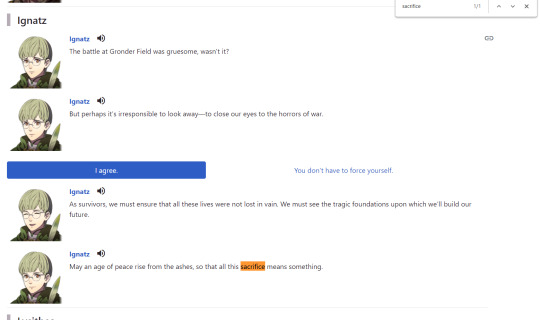
Ignatz’s further implies that the sacrifice made at Gronder does not mean anything - it is senseless, and without purpose. It must be given meaning after the fact; it holds nothing in and of itself, as it did not bring about its desired outcome
Next, Catherine:
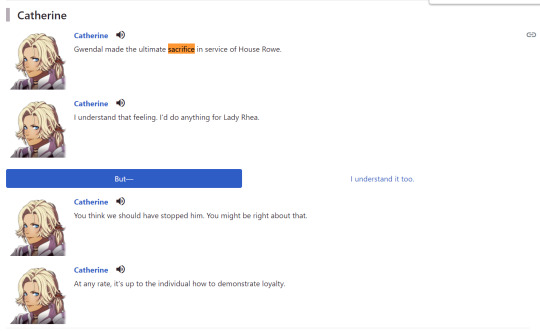
Sacrifice of the self is seen in an understanding light while simultaneously being seen as something that ought to be avoided. It is also something that is shown to be something that must be up to the individual to decide for themselves, though is regardless seen as something that likely should be talked out of doing
Last for AM, Felix:

The voluntary, willing sacrifice of one’s own life, for the betterment of others, is portrayed as something “positive” that must be repaid by those which the sacrifice was made for. It is not something that can be morally justified in forgetting after the fact - the repayment needs to be made in order for the sacrifice to be “positive.” The intended outcome of the sacrifice must be fulfilled in order for it to be seen as good.
In AM, sacrifice is continuously referred to negatively. Dimitri outright denies the possibility of necessary sacrifices, and the only way sacrifices are seen in a “positive” is if they are 1) willing made by the person sacrificing themselves and/or 2) the desired outcome of the sacrifice is definitively achieved, with the latter stipulation still having caveats that prevent it from ever truly being seen as positive (Count Rowe)
Lastly: CF
Edelgard mention the word sacrifice the same time as Dimitri first does, after Lonato:

Sacrifice of life is seen as a necessity. Edelgard views sacrifice as something that cannot be avoided, and as such, she has no qualms in sacrificing her people’s lives to achieve her goals. She views her cause as having an inherit superiority over the lives of the people.
Next, during the invasion of Garreg Mach (once you’ve settled on CF as a route):
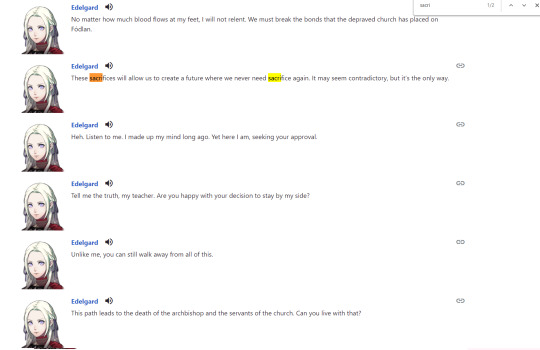
Sacrifice of human life is once again seen as a necessity for Edelgard to achieve her goals. She states that she will not stop no matter how much blood she spills for her cause. The sacrifice of life is involuntary to those making the sacrifice, and yet it is seen as something that will lead to a positive outcome. The cause is given greater importance over human life.
Next, post ts, before Claude is fought:
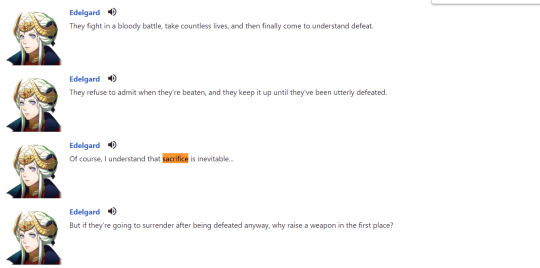
The want to not sacrifice own’s life for their cause is seen as a negative. The idea of attempting to save one’s own life at the prospect of certain defeat is questioned in its rationality. There is a lack of understanding in the idea of not sacrificing one’s self to the cause - this is further shown in Edelgard’s death in all other routes, which is caused directly due to her unwillingness to give up her greater cause. She views her own human life as having less importance than her goals, which is consistent with her ideology of sacrificing everything for the greater good.
Notice the other two mentions of the word sacrifice in CF
Linhardt, at the final chapter (which appears in all routes, mind, but since he does default as a BE I feel it pertinent to include within the CF section):
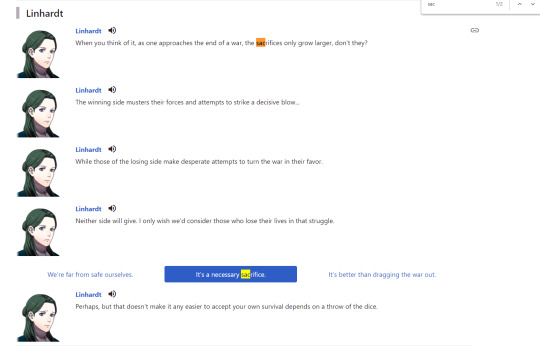
Sacrifice is seen as a sign of desperation. The idea of sacrificing human lives for a greater cause is no longer comforting or a good enough justification. It being described as “depend[ent] on a throw of the dice” directly implies no control from the one(s) sacrificing their lives.
And the last mention is from Rhea, during the last battle, referring to Rhea burning down Fhirdiad:

Sacrifice is being actively questioned. Edelgard’s reaction to Rhea forcibly sacrificing lives showcases the act as negative. Rhea, in all other routes, is one of Edelgard’s sacrifices she makes for her cause, and now Rhea’s mirroring of sacrificing the people’s lives for what she believes is right is being shown in a explicitly negative light. This is not Edelgard growing to realize that sacrificing human life is wrong as she does not reflect on her own doing so when she criticizes Rhea for the same thing.
In CF, when it is Edelgard speaking of sacrifice, it is always seen as a necessity - something that must be done in order to achieve change. Edelgard actively forces sacrifice on the people due to her believing that her desired outcome cannot be made without it, and so she makes little effort to mitigate this involuntary, large-scale sacrifice.
But, when similar ideals of the value of human life against one’s own cause is applied to those which oppose her, she no longer sees it as morally justifiable to sacrifice the lives of the people, despite her own willingness to do the same. When sacrifice is seen through the lens of someone other than Edelgard, the idea of sacrificing lives for the greater cause is no longer enough to justify it.
In contrast to Claude and Dimitri, who do not view such sacrifice as a necessity and thus do not attempt to justify it/force it upon others (except when Dimitri explicitly is doing something wrong, as directly stated by the game), Edelgard cannot fathom the possibility of being unable to sacrifice human life and achieving her goals at the same time. In contrast to Claude and Dimitri, who hold human life above their goals (except when Dimitri explicitly is in the wrong), Edelgard holds her goals above human life. Human life - including her own - has less worth than her goals, thus making it acceptable to sacrifice.
And, well. Considering that people are still being killed in most of Hubert’s endings due to all of the revolts and rebellions against Edelgard’s abrupt, violent, bloody rule rising up, the commonfolk are still not able to receive titles/military credits unless they marry into families which already have that (save for one character, who was previously noble already), and that freedom of choice is not guaranteed as shown by Bernadetta’s endings, along with the slew of other problematic elements in CF’s endings (especially when compared to VW and AM, whose endings portray a far more peaceful Fodlan)... yeah, the sacrifices absolutely did not achieve their stated desired outcome. And that’s when they were voluntary
#anti edelgard#Anti-edelgard#Edelgard discourse#Edelgard critical#just to be safe#and to be clear - Dimitri did not force sacrifice on his men on Gronder#but more that he only explicitly tries to save Dedue by telling only him to retreat if he's in danger (falls in battle)#he - in that moment and in specifically VW which is his lowest point character wise - has little care for the safety of his friends#Dimitri states that it's him sacrificing his friends when it's more accurate to say he was indifferent to their safety (barring Dedue)#hence the phrasing in that part#but uh like#overall#ignore my ass if this seems too reachy lmao#i just thought it was interesting to look into how each lord uses the word sacrifice specifically#since it holds such a dramatic and intense feeling to it#but i can see how it can sound kinda meh as a premise for analysis lmaooo#feel free to tear it to shreds lol
35 notes
·
View notes
Text
Public warning
Patricia Walker does not do well with lack of control. It’s a tendency passed down from life with Dorothy Walker, easily the most controlling non super-powered person she had ever met. For the first eighteen years of her life, most of Trish’s actions, from her clothes to her work to her every public word and expression, had been chosen for her by Dorothy, and the only real choice she had for herself was whether to give in and make life easier for herself or rebel and suffer Dorothy’s wrath.
Her desire for the control she had lacked had left her with severe insecurity, eating disorders, and self medication through drugs, all issues she struggled with for a good ten years before channeling her need for control into efforts at bettering herself and helping others. She had finally reached a place where life was stable, heading in a direction Trish could be content with, if not fully satisfied.
And then Kilgrave happened. First to Jessica only, without Trish having any idea why her best friend had suddenly vanished without contact for eight months, and then with the shattered mess it left her once Trish did know and struggled to support her. Then to Trish herself, when she, against Jessica’s orders and even pleas, involved herself in trying to draw him out and capture him.
Trish knew she had not suffered anywhere near the level that her sister had from Kilgrave, but it was still enough to make her feel sick and cold when she remembered. She still occasionally had nightmares of his cold, snapping voice, telling her to shoot herself in the head, telling her to kill people she had never met before out on the docks. She still shivered in disgust when she remembered the feeling of his hands on her face, his lips on her skin, the terrible ambivalence of wanting to kiss him, enjoying it, even as every part of her true self screamed out in horror. And she could never forget Simpson’s hands around her throat, choking her nearly to the point of death at Kilgrave’s command.
She had hated and feared the man from the first moment Jessica managed to stutter out what he had done to her. No, she had hated him before then, when she first saw the unnaturally shocked, broken state of her sister when she finally broke free from his initial control. Anyone who could hurt Jessica so deeply and so permanently earned her hatred without needing to know their identity.
And now he was back. Again. As much as Trish feared for herself, for being used or even killed in his obsessive pursuit of Jessica, she feared even more that Kilgrave would damage Jessica even more deeply, that he would continue to pile up dead and damaged bodies around himself and place the blame at her feet. Jessica didn’t need this, not again. And if Trish could do anything to help or stop it, it would help her feel just a little bit more of a sense of the control she knew she didn’t really have.
She made her way to her recording studio after first sending some of Heroes for Hires guards ahead of her to thoroughly check out the studio for any signs of danger from Kilgrave or any of his like, giving them a code phrase to use to insure that they would be able to alert her if he did show up and control them or others. Trish had already called ahead to insure that all people were thoroughly searched for any possible weapons and passed at least twice through the metal detectors already installed before being allowed entrance. After receiving the all clear, she went, Jessica insisting on accompanying her, via one of Danny’s cars to the studio, passing through the checks put in place and heading straight to her recording studio and instructing the techs to set up for a live broadcast. She was aware of Jessica skulking behind her, hands shoved in her pockets, as Trish rapidly read from the speech she had just finished churning out.
“Good afternoon New York City and beyond, this is Trish Walker with an urgent report coming to you from Trish Talk, by way of myself and all our associates at Heroes for Hire. Soon, a follow up broadcast will be coming your way via Channel 5 News with more information, but please, listen very carefully to this announcement for your safety and those of your loved ones.”
Trish paused, swallowing, and snuck a glance back at Jessica’s impassive expression before facing the mic again and continuing. “Most of you may remember the terrible events of last summer, when the man whom called himself Kilgrave provided mass terror and destruction in our city and in far too many of our own lives and homes. It is to my great sorrow that I inform you that Kilgrave is not, as was believed, deceased. Kilgrave has made personal contact with myself and with-“
Jessica made violent throat slashing motions behind her that Trish saw out the corner of her eye, and Trish edited her intended words smoothly.
“With myself and my colleagues, and we have evidence to support that this is no hoax. Please be aware of yourself and those you love at all times. Know their whereabouts, establish coded phrases and patterns of behavior in order to test out the level of control the people in your life may have at any given moment. Kilgrave is a white male with a British accent, last known to have short medium brown hair and brown eyes. He tends to dress in a professional manner, especially in dark purple suits and ties, and he is considered a threat of the level of nuclear war. Do not approach him should you see him; instead do all you can to get away and call in our hotline at Trish Talk or Heroes for Hire to report a possible sighting. If you suspect that someone you know may be controlled, treat them in the same manner, do all you can to subdue them without causing permanent harm to them if necessary. Kilgrave’s powers last up to 12 hours, so do not under any circumstances try to reason with anyone you suspect to be controlled. If at all possible, wear ear plugs or head phones or listen to loud music when necessary to go out in public. Kilgrave cannot gain control of those whom are not within his direct path and whom cannot hear his commands. He-“
“Stop,” a voice suddenly came over the ear, and both Trish and Jessica jumped, recognizing the voice after a moment as not Kilgrave’s, but female and American. Trish quickly identified the voice a second later as belonging to one of her tech support assistants, Chloe Ash. “The information is over.”
“What the fuck?” Jessica hissed, shooting Chloe a vicious glower and striding towards her quickly. “Will you shut up, even I know to shut the hell up on a live recording, over something this damn important!”
Trish tried to recover, giving a somewhat forced chuckle and speaking over them. “I apologize, there are some technical difficulties, but if you’ll bear with me I will make sure you all get the information you need. As I was saying, Kilgrave cannot-"
“This information is too much, this recording is over,” Chloe repeated, more loudly and forcefully, standing up and taking the headphones off of her ears. She fairly shouted out her next few words, speaking loudly enough that Trish’s words were drowned out.
“Loyal listeners, you will now hear the sound of a suicide by Chloe Ash, Patsy Walker’s employee. More are to follow in the names and as a direct result of the avoidance and rejection of Jessica Jones. Goodbye, loyal listeners, and know that Kilgrave is a patient man.”
She head butted Jessica in the face when Jessica grabbed for her arm, ducking under her and weaving to the other side of Trish. As Trish leaped up, expecting Chloe to grab or try to harm her, the young woman instead ran to a small cabinet against the walls containing little more than sound equipment and various office supplies. Throwing it open, she grabbed a pair of scissors from its contents, opened the blades wide, and closed them around the front of her throat.
She made no sound, showed no pain as she dragged the scissor blades more deeply into her skin, sawing back and forth to make as rough and deep a wound as possible. The live recording now picked up the sound of Trish’s horrified scream, her outcries of “Oh god, no, no!” as blood spattered in a wide arc just short of reaching her, and the noisy scuttle of multiple feet moving towards Chloe as others tried to reach her before it was too late.
Jessica got to her first and wrenched the scissors out of her hand, breaking them in half and throwing them down so Chloe could not get them and use them any further. Tearing off her oversized sweatshirt, she pressed it against the woman’s throat, grimly noting how the blood immediately stained through its thick material and onto her fingers, how it had sprayed hot and thick over her arms and chest before she could touch her at all. The woman didn’t try to speak, likely couldn’t have, but she was losing all color in her face, her eyes already growing glassy and lifeless, and as Trish sputtered and tried not to vomit or pass out in the background, Jessica held onto the almost useless bloodied sweater, as though she could somehow keep the woman alive just by holding on tight enough.
It didn’t matter. Within another minute the woman was clearly dead, limp and unmoving under Jessica’s hands, and she could hear the shrill noise of sirens in the background. Jessica let her drop to the ground, stumbling back and nearly yelling out loud when she bumped into Trish and felt her hands latch onto her arm.
“We have to go, now,” she mumbled, giving her sister’s arm a rough tug.” Before someone else of his comes through in the aftermath.”
Even as she lead Trish out of the room and building, she could still hear the dying woman’s words echo in her mind. More are to follow, as a direct result of the avoidance and rejection of Jessica Jones…

#jessica jones roleplay#Jessica Jones#Luke Cage#luke cage roleplay#trish walker roleplay#trish walker
129 notes
·
View notes
Note
concerning the ask about Ian bein the eldest child - I wonder how his relationship with Micky would even play out, when he'd have less free time and maybe a more realistic (less romanticized) view on life in general? Like, do you think he would chase after him like he did in the earlier seasons? I don't know, the whole "Ian is the eldest child" is facinating to me
Oh, this is an interesting one! I think there’s two different aspects to consider here: 1, would Ian and Mickey even be interested in one another if Ian were the eldest, and 2, if so, would pursuing a relationship be feasible under these circumstances?
I'll deal with the first issue briefly, and then with the second one at some length. Lots of different parameters to take into account here... This is obviously going to be speculative as hell, and I’m teasing the whole thing out as I type, but let’s see–
As was mentioned in the discussion that promted this ask, it’s difficult to know to what degree Ian’s personality would have been different, had he been born the eldest child – and even harder to know how that would have affected his compatibility with Mickey. He’d probably still would have been tough as well as compassionate, two qualities I believe are key to him being attractive to Mickey, but I’m less certain that Ian would have found Mickey quite as charming if he was already saddled with the responsibility for five younger siblings and a drunken father… ? And maybe Mickey embodying the South Side male in ways that mirror both Terry and Frank (look at their similar choices in clothing) would have been more of a turn off for firstborn!Ian, since he’d be the one who primarily had to deal with consequences of Frank’s many failings? Ian being a bit of a chameleon himself has him being more appreciative of Mickey being so extremely unconcerned about the opinions of others, but he might have been less amused with Mickey’s crudeness if he was dealing with a lot of other shit already? Then again, maybe none of this would have mattered! Maybe Mickey’s directness might be especially refreshing if your life’s generally a huge fucking tangle and you have slippery fuckers Monica and Frank to contend with on a daily basis. And although I think that the fact that canon!Ian often feels a bit invisible and like he's living in Lip's shadow might contribute to him fighting so hard for that connection he feels with Mickey – chasing after him, as you say – it might well be that even if he'd been the eldest, he'd still be seeking that out, because so much of his life and time is dedicated to his siblings and he yearns for something that is only his, only for him.
No easy or immediate answer to this question, though I suspect most of us prefer to think that they’d have liked each other anyway. Heaven knows there are plenty of AU:s built on this assumption.
Oh, and then there’s the whole question of pheromones. Now, obviously that’s not the be-all and end-all on sexual attraction, but given how very quickly Ian and Mickey go from trying beat the creap out of each other to eagerly fucking, and how Ian is very clear about liking the way Mickey smells, I think it’s fair to say that chemical compatibility is a pretty big factor in them first getting together. (It sure as hell isn’t the only one, but still.) With that in mind, I may or may not have had my partner, who’s a clinical research biologist, look into the epigenetic properties of pheromones (i.e. to find out if how you grow up might affect your natural body musk to the point where you’d be chemically attractive to other people than you are now). It’s not entirely clear and – predictably – the research done on what part pheromones play in sexual attraction among humans has been primarily focused on attraction in heterosexual people, but it seems that conditions in the womb and external factors in childhood (as well as changes later in life, such going on the pill, being stressed or having a disease) would affect your smell. However, we can’t readily know if and to what degree just being born first and having to take on the responsibilities of being the oldest sibling would affect Ian’s musk, and if it would decrease how attractive he is to Mickey (that it would increase it seems an impossibility because these two are already so insanely, stupidly horny for one another).
Okay. Having tentatively concluded that we can’t know for sure whether or not Ian and Mickey would still be into each other had Ian been born first (and hence not been quite the same person), let’s recklessly assume that they would, and turn to far more intriguing discussion of how their relationship would actually play out.
Do we imagine that Ian is a few years older than Mickey then, the same age as Fiona would have been at the start of canon? Maybe it doesn't matter much – it's not a huge difference, but to be honest I feel a little ickey about it since Ian would be an adult and Mickey still a teenager (and not a particularly well-adjusted and healthy one at that). Hmm. Either way, I can see them getting together in much the same way, with Ian doing something nice for Mandy – intervening when she's harassed at the local store, maybe, sparking a little hero crush on her part – and that whole thing going down more or less as it does in canon. But if it does, and Mickey and his goons beats up Ian's younger brother Lip in Ian's stead, I think eldest child!Ian might be really, really pissed and out for blood? Which gives him a nice incentive to go look for Mickey, even if Kash is not part of this picture (and I think that he's probably not). So far, so good... but if Ian's this much older than Mickey – four years? – Ian will already have started to fill out, right, turning all tall and buff, and Mickey might not have such an easy time overwhelming him. Then again, that might not necessarily serve as a deterrent to Mickey at all, so the end result is probably still the same, surprise sex fuelled by adrenaline, pheromones and general compatibility.
But... then what? To be honest, I think it'd be very difficult to make it work under these circumstances. If Ian is older than Mickey, Mickey might well have a much harder time feeling safe with him, just because he might feel like he doesn't have the upper hand in the relationship – and in the beginning I think it was VERY important for Mickey to feel like he had control and was calling the shots on when and how they met up. Four or five years is not a big difference at all later in life, but if you're 16 and your lover is 21 (or thereabouts, I'm still not super clear on the timeline, but ballpark) and they're also used to running an entire household and therefore accustomed to being in charge... I don't see this working for Mickey, not enough so that he dares let his guard down to the point required for their relationship to develop.
As for Ian, I think he'd have far less patience with Mickey's standoffishness and unwillingness to committ or even admit that they have anything beyond sex. Ian wouldn't have the time or energy or disposition to deal with that, not on top of everything else, and furthermore, it seems like it'd be very hard to keep his clandestine meeetings with Mickey secret when he's the lynchpin of the family, always taking calls and dealing with sudden emergencies. To make it properly work with Fiona, JimmySteve has to more or less move in more or less immediately and adjust his life to fit with her chaos; it'd arguably be the same for Ian, yeah? Don't really see the still very much closeted (and terrified) Mickey actually doing that – moving in, helping out with the kids and what-not. (One could also hope that Ian realizes that pursuing a relationship with a still underage Mickey would be inappropriate and calls it off for those reasons.)
So, realistically, if there's an age difference and they meet at the same time as they do in canon, I think there might be a few hook-ups, but it would fall apart rather soon, in spite of their very strong attraction. But! Maybe in a few years, when Mickey's older and the age difference less meaningful, and Mickey's had the chance to become a little more accepting of himself and his orientation, and Ian's siblings are just a little bit older so that Ian can take some more time for himself... maybe then they could run into each other again and that old spark roar back into life and they take it from there? It'd still be an uphill struggle, of course, but they've dealt with those before and always – eventually – come out on top. The whole Svetlana thing never happened, Mickey is fully on his way to coming into his own at the king of the South Side, Ian is trying to figure out who he is outside of the Big Brother, maybe Mickey is out, maybe he's not, maybe Terry is gone, maybe he's not... If one is so inclined, I think there's some fun to be had with this idea. I am, however, more partial to another:
Say that Ian's still born when he was born, so still a couple of years (according to the forms they fill out when applying for a marriage license) younger than Mickey. Maybe then, even in spite of his added burdens and responsibilities, he'd still be naive and soft enough to have a bit more patience for bad boy Mickey? It'd be before Monica ran out on them, so maybe there are still times (few and far between) when Ian doesn't have to take full responsibility for his siblings; times when he can pursue what he wants instead. And Mickey would feel more in control and safer dealing with babyface!Ian, so maybe he'd dare a bit more?
Maybe he starts hanging out at the Gallagher house after that first fuck, for a chance to be near Ian. The rest of the siblings would be young enough that he feels confident (although perhaps mistakenly) that they'll not pick up on what's going on, so as long as Frank and Monica are out (or out of it), Mickey's happy to come around. Hang out, fuck whenever they can, maybe even help out a tiny little bit when Ian makes him, and in spite of his best efforts and intentions he gets more and more pulled into Ian's life. This, I think, could potentially work, although I expect the same sort of up and downs as we get in canon. Mickey probaby won't get shot by Kash (because I think eldest child!Ian would be a little less susceptible to his ”charms”), but Frank could still – very easily – walk in on them. It would get overwhelming at times and Mickey would push Ian away and flee; Ian would get impatient with Mickey's insistence on distance and NO EMOTIONS ONLY SEX (more so than he is in canon, I think) and tell him to shape up or fuck off. It'd be volatile for sure, but in the end I think they'd always return to each other, adapt and try a little bit harder to make it work. Pull's just to strong, you know? Maybe it'd even happen faster than in canon, if Mickey isn't sent to juvie that first time, and if they have more opportunities to spend time together doing stuff other than fucking (ie just hanging out at the Gallagher house under the pretext that Mickey's just a friend, which Mickey would allow, thinking the younger siblings clueless). Really wouldn't mind reading this fic, you know, though I'd mourn Ian's relationship with Lip in this alternative reality. (Like, there’s SO MUCH potential! Maybe Mickey lures Frank and Monica away on a drug weekend just so he can stay at the house with Ian, even if it does mean having the help out with the little ones! I can see angry teenage Mickey being made to help Debbie with her math homework! Feed baby Liam! Supposed to stop tiny Carl from doing horrible stuff but ending up helping him instead! Ian is not amused! I want it!)
So, uh. That's my speculative take on this, for now. Very open to being swayed by other people's opinions, though, so I'd love to hear them, or whatever additional thoughs you might have.
Thank you so much for the ask: I had a lot of fun thinking about this, and hope that you found somet sort of satisfaction in my long-winded ramblings. <3 Also, I'm sorry it took so long to get back to you! As I've noted before, I'm unreliable (and sometimes busy).
16 notes
·
View notes
Text
Ebb and Flow
Summary: She has always been watching him, hasn’t she? From the moment she met him. Maybe it was inevitable she would start seeing other things. Astarion x Isaniel
Also check it out on AO3 here and ff.net here!
A/N: whelp, here I am. writing fic with my OCs. that never happens. but this cheeky little bastard left me no choice. I fell in love with him so quickly, I had to write how my character did (or is starting to...getting there...feeling feelings...look we're still in EA and I love slow-burn enemies to lovers).
Minor spoilers ahead!
-
A mix of old paranoia and carefully-honed insight tell Isaniel, from the moment she meets him, that Astarion is suspicious. The only reason she even approaches the grass is because the risk of leaving an intellect devourer on the loose is far greater than the risk of exposing her back to a stranger. One is a dangerous beast that could quickly kill her or innocents if left unchecked; the other, she believes, is just an elf she knows to be wary around. He cannot do anything she is not braced for.
She is wrong. He is far stealthier than she’d expected.
-
After she diffuses the situation and they agree to work together, Isaniel subtly flexes her left hand. His dagger had cut into her palm as she’d struggled to pull it away from her throat. It was deep enough to merit healing, and she knows it’ll scar. A lesson.
It’s not an easy thing, to watch your surroundings and look for other survivors and keep someone in your peripheral vision, but she manages.
-
That night, everyone at camp is wary, watching each other, gauging their trustworthiness. They’re all newly acquainted, a collection of cast-off captives with bombs in their heads. It’s simultaneously the most ironclad and the thinnest of bonds. But gradually, one by one, they drift off.
Isaniel tries not to. Decades of learning to embrace Eilistraee and lower her guard around others have vanished tonight. She sits, staring at Astarion across the fire, and he stares back. His eyes are somehow both jeering and flirtatious, the planes and shadows of his face even more beautiful in the firelight. They sit for hours, just watching each other, her quiet declaration that she wouldn’t turn her back on a stranger heavy between them.
But eventually, exhaustion creeps up on her and slips the trance over her head, and then it is morning.
His smugness is unbearable.
-
Isaniel considers herself a practical woman. You can’t not be and survive the Underdark. She will refuse to give up on a cure until her body physically starts to change, but she knows that the second it does, she wants the others to cut her down—the same way she’d cut them down if they began to transform.
So when Astarion asks how she wants him to kill her should she sprout tentacles, she’s not affronted. She sees it as professional courtesy.
After some thought, she decides on a knife. Poison is not gentle, nor quick. Neither is strangulation. A good, clean thrust to the heart or head, though, will be fast and painless. The best result for her and those around her.
His eyes light up with enthusiasm as he discusses her choice, and Isaniel remembers how quietly he’d snuck up on her. This is not just professional courtesy, she realizes. This is a man who intimately knows the art of death, and loves it. And at that realization, the walls that had started to cautiously lower, just a tad, jerk back into place.
When he finishes, she crosses her arms, cocks her head, smiles coolly. “And you? How shall I kill you?”
His teeth flash an almost unnatural white when he grins. “Oh darling, I’d love to see you try.”
-
The night they gain some leads, she finds him stargazing while doing the rounds of the camp. When she pauses to speak with him, it is surprisingly nice. His quip about “taking or leaving” her chin makes her lips twitch, despite herself. And she can’t help but approve of someone who can also appreciate the beauty of the night sky.
Her eyes seek out the moon instinctively. Her hand closes around her sword pendant for a brief moment. Eilistraee, watch over me.
For a brief heartbeat, an echo of a song floats through her mind. It’s the same music that stopped her dead in a marketplace in the Underdark, so beautiful and ethereal and divine it almost brought tears to her eyes. Isaniel would later learn that Eilistraee was always seeking to touch the hearts of the drow, and had been beyond grateful she’d listened. But at the moment, all she had known was that she could not rest until she’d found that music again. Hearing it again now is a promise.
The notes fade, but she doesn’t feel empty like she did that day in the Underdark. Her goddess is with her and loves her, and there is nothing more comforting in the world than that. Even Astarion seems not so bad in that moment, and they bask together in the companionable silence.
But then he wonders aloud what will happen in the future, and the illusion of safety breaks. She briefly mourns its departure; then, she straightens her shoulders and looks back at reality. And reality includes him.
She gives him a taste of his own medicine: “What? Would you miss me?” He laughs, rises, and compliments her. She accepts it, and in doing so deflects. He flirts, invades her personal space. Out of sheer stubbornness, she refuses to step back. To do so would be to admit that he has unnerved her. It’s not just his proximity; it’s this undercurrent of something.
The dance ends; he leaves. The tension drains out of her body.
-
When she emerges from a restless, unsuccessful trance and finds Astarion leaning over her, Isaniel lashes out. Her elbow catches him square in the jaw; he curses and stumbles back, and she almost attacks while he’s off-balance. But she’s a follower of Eilistraee, and somehow, she’s become the leader of their group. Both of those factors give her a responsibility to hear him out. So, she stomps down on those old, false instincts and lets him talk.
It’s almost a relief to find out he’s a vampire. The secret is out, and now she can deal with it. Really, Isaniel feels like a fool for not putting the pieces together. The sun doesn’t burn her eyes anymore, thanks to the tadpole—why shouldn’t a vampire be able to walk in it as well? But she’d just assumed that his red eyes were indicative of drow blood somewhere in his family, the fangs some form of genetic defect.
Astarion asks her to trust him. Incredulously, she counters that he tried to bite her. He retorts that they need each other. And then he begs for a sip of her blood.
Isaniel takes a deep breath. Looking around, she realizes that their brief scuffle woke the others up. She decides to give them the benefit of the doubt and assumes that they only watch because they’re too surprised to actually do anything. But that’s irrelevant right now. She turns her focus inwards and analyzes exactly how much they need Astarion.
He’s the best among them at picking a lock. His speed is blinding. He’s deadly with his daggers. And he moves so silently…
Losing him would be bad, she has to admit. So: keeping him means feeding him. And logically, it makes sense that a vampire would not find animal blood as nourishing. Oh, she knows he’s manipulative, she doubts he’s telling the whole truth with his “I’ve never fed on humans!” spiel—but she does believe him in that, at least.
She certainly can’t half-starve him, but she will not let him eat innocents. So…what other options are there? Letting him feed off their enemies? Plausible; but that is a question for the morning. Because Astarion is ultimately right: it really comes down to whether she can trust him.
Isaniel doesn’t know what surprises her more: that she does trust him, or that the events of this night haven’t cost him all of it.
Well, she trusts him to an extent. She gives him his share of night shifts, she relies on him in battle, and he has easy access to their food. But that’s trusting him not to kill them; keeping him, knowing what he is, requires trusting him to not lose control. It means trusting that if an emergency happens and he needs their blood, he won’t go into a frenzy and drain them dry.
A test, then. If he reverts to a creature of base instinct, if he cannot be reasoned with, if he tries to kill her, she will kill him. Better to discover the extent of his self-restraint now, while she’s alert and prepared to stop him, than later, when circumstances might not be so fortuitous.
So she sends up a quick prayer to Eilistraee, bares her neck, and lies down.
-
He gets caught up in the moment, but her command to stop brings him out of it easily enough. He lets her go, breathless and smiling, thanks her, and stalks off.
Isaniel can’t be angry at him; after all—and this is very hard to admit, even to herself—she almost got caught up in the moment too.
-
Sometimes she would catch him gazing at the sky, during the day, open wonder on his face. Now she knows why.
Isaniel can understand that. With her eyes no longer burning, she can drink in the tableau around her in a new way. There are shades of color she couldn’t quite discern before, and everything seems so much richer in the sun. How many drow have been able to do this? Very few, most likely.
It’s not enough to make her want to keep the parasite—it could never be enough—but it is something she can’t help but appreciate.
-
The day the sickness strikes, Isaniel gives the order to make camp where they stand, long before night falls. They’re all just too exhausted to keep traveling, even to search for a suitable place to rest.
That’s not the only thing they’re too exhausted for, as it turns out. Not one of them can muster the energy to scout for nearby threats, or camouflage, or stand guard. Even Lae’zel’s attempt at a “mercy kill” is sloppy. They’re all so pathetic a kobold could walk into their midst and kill them.
Between talking Lae’zel down and doing her customary rounds of their parody of a camp, Isaniel’s low energy reserves are completely barren. As she crawls into her bedroll, for some reason, her mind turns back to Astarion’s panic.
He’s usually so self-assured. Smiling in the face of anything. Ready with his rapier wit. The complete unraveling of his composure is…alarming.
But before she can think much more on that, a fresh wave of tremors hits her. She squeezes her eyes shut, curls into a ball, and prays.
-
The next morning, Isaniel wakes up with heartache—and fury.
How dare it? How dare that parasite approach her in the guise of her dead husband? How dare it speak with his voice, ignite her skin with his touch, dishonor his memory by wearing his face? The sickness of the previous night is completely forgotten; instead, she shakes with rage as she brushes her hair, checks her equipment, gears up. Her fingers itch to play her lute and vent it all out in jagged, discordant music—but no. Astarion’s pale form is up and about, but the others are still sleeping.
She pauses and subtly studies him. He looks much better now; his movements are fluid again, his step springy. Even his hair somehow seems extra fluffy.
He turns, catches her staring, and winks. She rolls her eyes, but her lips twitch, damn them. Definitely back to normal.
At that, the memory of the dream rears its head. Her anger, which had started to simmer down, flares up anew. Isaniel scowls as she struggles with her sword belt, her normally dexterous fingers made clumsy by emotion. Curse that tadpole to the Hells—
“Well hello! Feeling better, are we?”
Astarions voice rings from right next to her, and she jumps. Eilistraee’s sword, how did she not realize he was a vampire sooner? No one can move that silently and swiftly and still be mortal.
“I certainly am,” he continues, without waiting for her answer. “This morning I find myself free of pain and with a new trick. A new power. Last night, the risk of transformation—it all feels like some terrible dream now.”
A dream…
Isaniel doesn’t know why she opens up to him. Maybe it’s because he’s around and she needs to get it off her chest. Maybe it’s because his witty tongue actually does make her chuckle, despite herself. Maybe it’s because he draws her eyes like the moon draws the tide.
Regardless, she ends up spilling the contents of her dream, anger and pain leaking into her voice. Astarion doesn’t really say anything; he just listens, eyes bright with curiosity and intrigue. But just listening is enough; she can feel an invisible weight lifting off her with every word out of her mouth.
When she finishes speaking—with an exhale of relief—he asks if she enjoyed it. Her fists clench at the memory of that intruder’s touch on her skin. “No, it felt invasive. Uncomfortable.”
“We had the same dream, then. The worm’s trying to be…enticing.”
Had he also seen someone he’d loved? But that blank look, the flat voice…there’s more to it than that, she’s sure. Isaniel hesitates, then pushes him to share. He lent her an ear, in his typical flippant fashion, but an ear nonetheless. It’s only fair to return the favor.
The truth of what he really dreamed about surprises her. She finds herself blurting out, “Your old master? That doesn’t sound ‘enticing’.”
“It was not,” he says, voice raw and low. “I—we don’t need to talk about it.”
And—oh.
That flash in his eyes. That pain.
Her throat closes.
It was brief, but she saw it. She would never mistake it.
It’s the pain of someone who has been trapped in darkness for so long they don’t even know light exists. The pain of someone who lived with cruelty every minute of every hour of every day. The pain of someone who does not let themselves feel pain, does not even acknowledge they are in pain, because that would be weakness and wolves would descend on them if they admitted to that.
It was her pain, before Eilistraee.
Isaniel is not good at comforting people. She knows how to talk people into doing what she wants and how to keep their group more or less from killing each other. But put her in a room with a crying woman or a scared child, and she’s just lost. Emotions are messy and difficult to deal with.
But at this moment, she wants, more than anything, to brave them. To let him know he’s not alone.
She can’t think of anything to say, can’t figure out how to put this epiphany into words, so hesitantly, she reaches out a hand—
And he recoils like a snake. Then, he strikes like one, eyes and fangs flashing, venom flying from his mouth as he renounces her pity.
It’s not pity, she wants to say. It’s not pity, because I know how hard it is to survive an environment that wants more than anything to break you. To pity you would belittle your strength. It’s empathy and support.
But she’s so stunned that by the time she’s able to begin, “It’s not pity,” it’s too late; his retreating back is the only thing that hears her.
-
One of Isaniel’s first memories is of her mother killing her pet bat, then slapping her until she stopped crying.
It was as a lesson, of course: that love was something that would only be exploited. The sort of lesson that every drow child learned young. Other lessons included how to think creatively, hurt others, scheme, and be paranoid—Isaniel still remembers carefully pouring poisons and potions into large, hollow glass beads and stringing them into her jewelry.
The lessons that had really struck a chord with her, though, had been how to create. Her family had been artisans, and had held a relatively secure position as employees to a well-off merchant clan. The plotting hadn’t been as intense as among the nobles, but it was still dangerous. After all, there were rival artisans and rival merchant clans to watch out for or destroy, and Isaniel had done her share of participating in that.
But oh, she had truly loved art, beauty, music. Eilistraee used that to reach her, and through it Isaniel came to love Eilistraee in turn. But it took a long time. Secretly seeking information about that music, a flight from the Underdark, and decades of studying the teachings of Eilistraee, testing them, putting them in practice, before the scars the Underdark left on her had begun to heal. Decades in which she found companionship with others of her faith, met her husband, became a mother…lost her husband to the ravages of time…
And now, after such a long time away from the toxic mindset she grew up with, she has come face to face with someone who embraces it. And she is torn.
There is a part of her, one that Eilistraee has grown and nourished, that is appalled in the face of Astarion’s casual cruelty towards others.
There is a part of her, one that Eilistraee has also grown and nourished, that begs her be compassionate and forgiving.
There is a part of her, one that she has abandoned but clings to her like a ghost nonetheless, that screams at her to end the threat before he ends her.
There is a part of her, one that has been with her as long as she can recall, that sees his trauma, and remembers, and empathizes.
Their experiences are not the same. But the darkness is the same.
She does not know what to make of him. She does not know what she should believe or do about him. So she watches, and speaks with him, and tries to understand.
-
Their travels eventually take them to a swamp, and there, they find a Gur. A monster-hunter. That in itself wouldn’t necessarily mean anything, but it’s foolish not to gauge his intentions, considering her company. So, in-between Astarion’s light insults, she inquires.
He says he’s hunting Astarion. Not to kill him, but to capture him.
Ice settles in Isaniel’s belly.
Capture him. And bring him to his “associates” in Baldur’s Gate. Back to Cazador. Back to the bastard who scarred him down to his very marrow. Back to chains and torment.
That’s not going to happen, she thinks vehemently.
Astarion is practically vibrating in place, his red eyes hard and uncompromising, his hands hovering close to his daggers. And yet, he still waits for her order. Out of genuine respect for her authority? Trust that she’ll neutralize the hunter? She’s not sure, but something about it is…a little touching.
She gives the word, and he lunges.
-
The battle with Auntie Ethel is tough, but manageably so. They all stay away from the cliff edges and destroy her illusionary copies as soon as they appear, they put out the fires near Mayrina and keep her out of harms’ way, and while the hag’s spells are powerful, they all somehow manage to avoid the worst of the damage.
But Auntie Ethel is one of those types. The type that likes to taunt and mock with a loud, clear voice that rings across the battlefield. And through some hag witchery, she knows how to hit where it hurts.
“Is there still rat stuck in your teeth, slave?”
She’s not near him, but Isaniel can see Astarion’s flinch—then his strikes resume, much faster and more furious than before. Her own teeth grind with outrage and sympathy, and she redoubles her efforts, and soon the hag is brought down.
She is not feeling quite as sympathetic when, after bidding a crestfallen Mayrina farewell, Astarion blithely remarks that it was a pity the young mother-to-be couldn’t see the funny side in her husband being resurrected as a zombie.
-
And yet, he voiced his approval back when they helped Karlach.
It’s not like that outweighs it. Life isn’t a set of scales. Helping one woman doesn’t balance out being amused at another’s pain. The people Isaniel hurt back in the Underdark wouldn’t care or forget just because she helped someone else now. Words and actions have permanent, tangible impacts.
It’s not like she wants to “fix” Astarion, either. People can’t be “fixed”. They can be broken or damaged by others—but never returned to who they once were. They carry the scars and lesions on their heart, like Isaniel does. With time and support, they hopefully heal, but that’s only if they want to.
It’s more like—and she might be projecting a bit, or biased because of her past—remembering Karlach gives her hope that Cazador didn’t destroy Astarion’s humanity.
-
Maybe it was inevitable.
Isaniel weaves throughout the party, smiles freely, even dances and sings. It’s impossible not to—the tiefling’s joy is infectious, the gentle warmth of the wine is infusing her body, and the moon is full and smiling overhead. All of her problems will still be there tomorrow, but tonight is a night for forgetting, and celebrating, and living.
The back of her neck prickles, again. This time she doesn’t ignore it. This time, she turns, somehow already knowing what she’ll see.
Sure enough, there’s Astarion, lurking on the fringes of the party, a glass of wine in hand, eyes fixed on her. Under the moonlight, his hair is practically glowing, his skin silver-tinted. He looks like some ethereal king of night and winter, standing there silhouetted against the darkness. It’s striking.
Striking. Oh.
She has always been watching him, hasn’t she? From the moment she met him. Maybe it was inevitable she would start seeing other things.
A jostle jars her out of her thoughts; she’d stopped moving right in the midst of the dancers. She mutters an apology to the tiefling couple and hastily clears the floor. Glances up again.
Astarion is still watching her.
Before she consciously decides to do it, her feet take her towards him. She falters when her mind catches up to her body, almost turns and runs. There’s something in his eyes, something in the air, something between them that crackles with intensity and promise.
But it’s too late to run—he’s coming towards her, too. Her heart lodges itself in her throat. Stay strong, she tells herself.
Whether she wants that strength to resist the shifting currents in their relationship or to swim towards them, she does not know.
37 notes
·
View notes